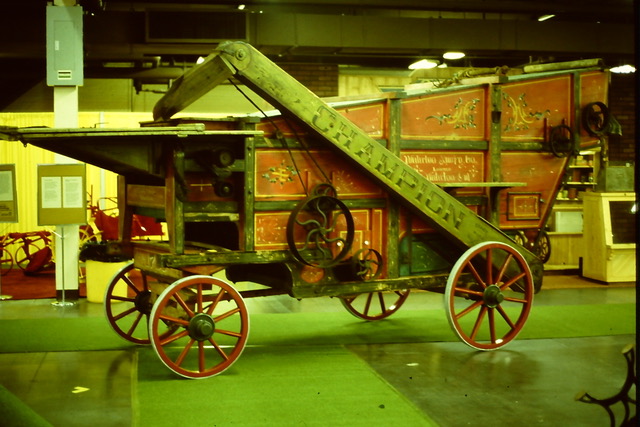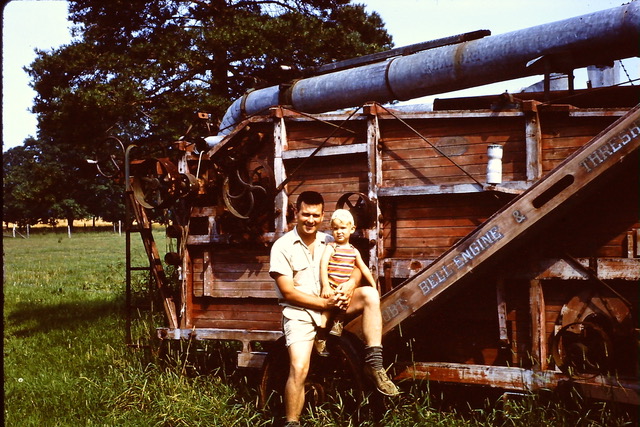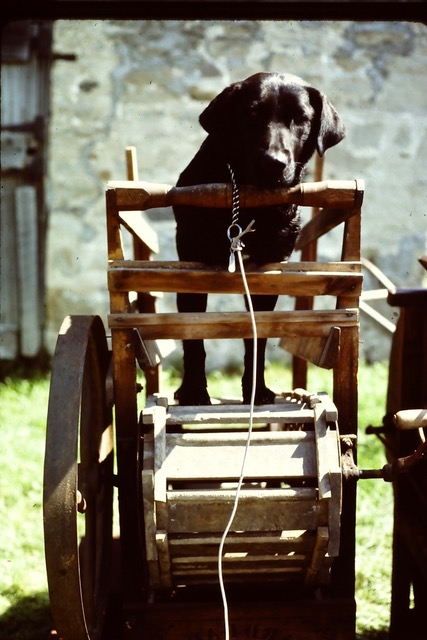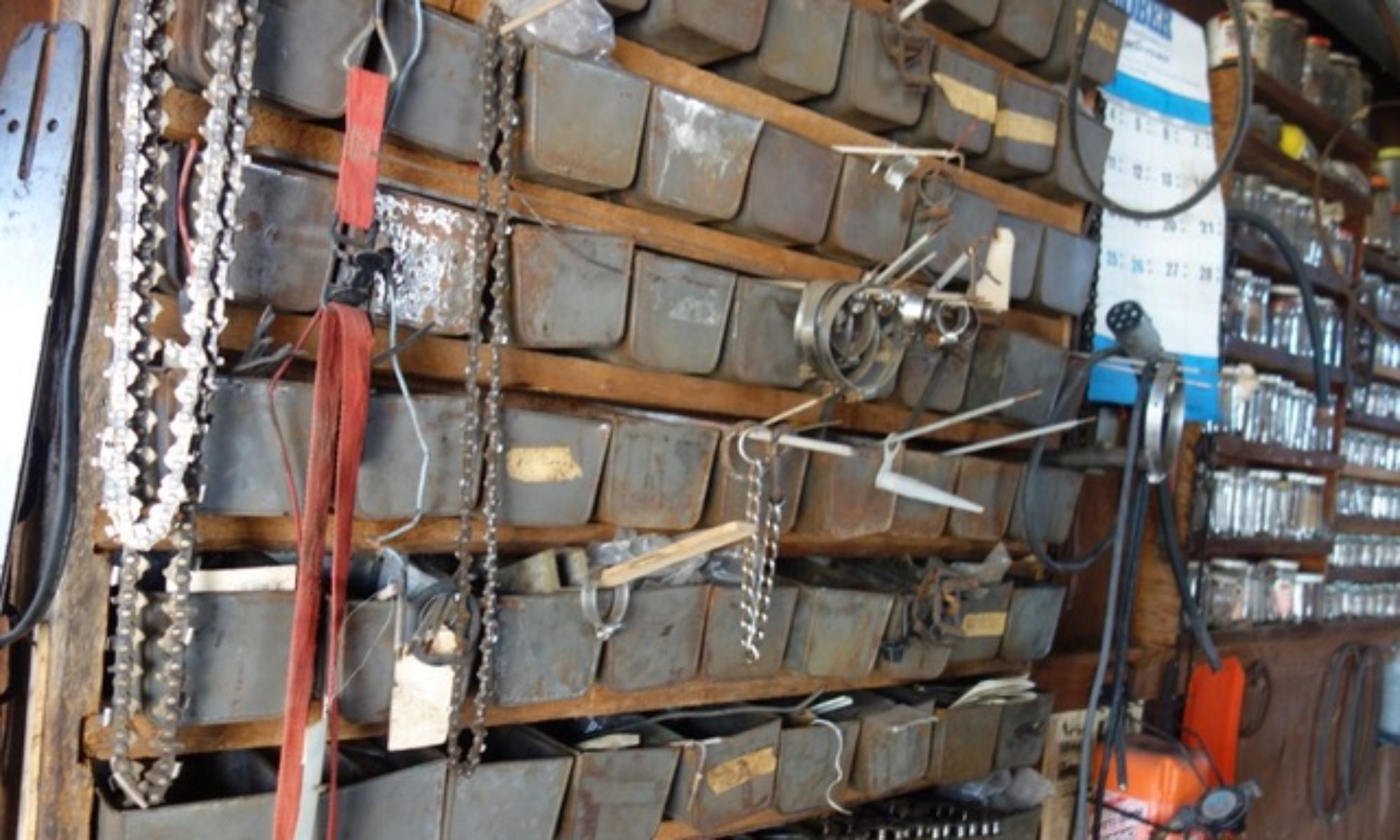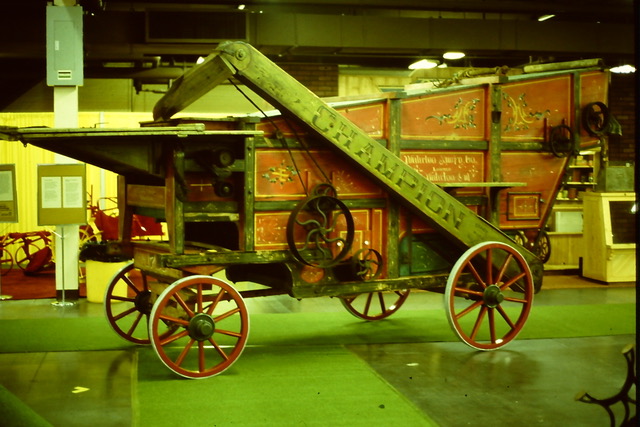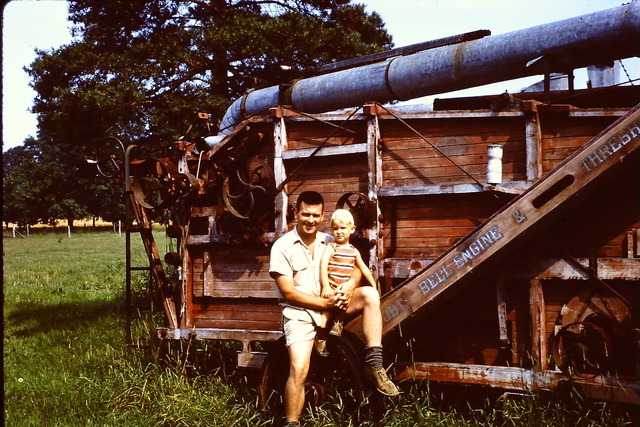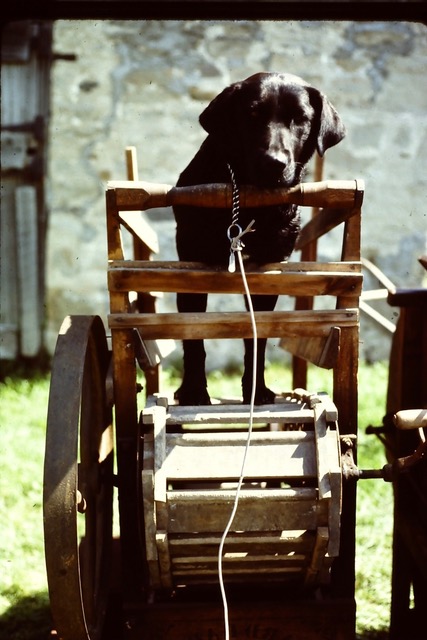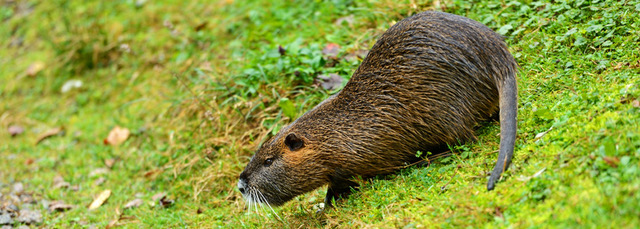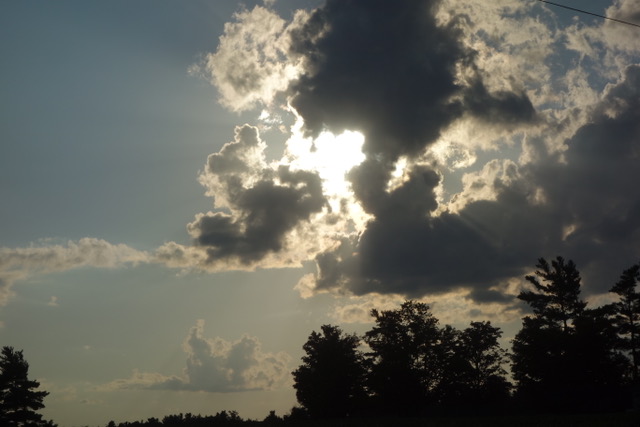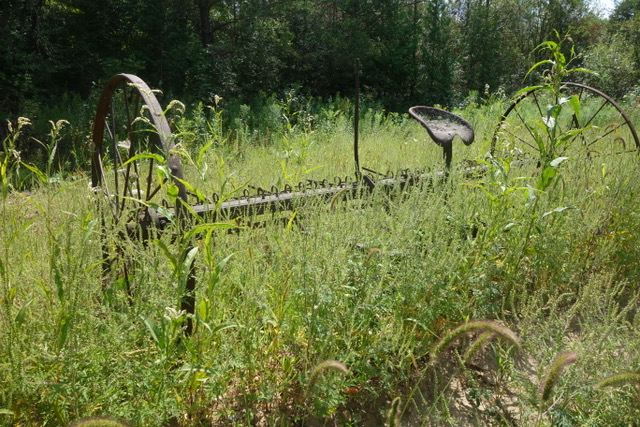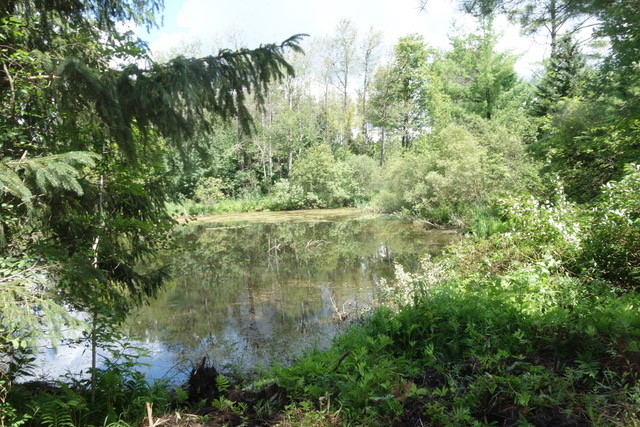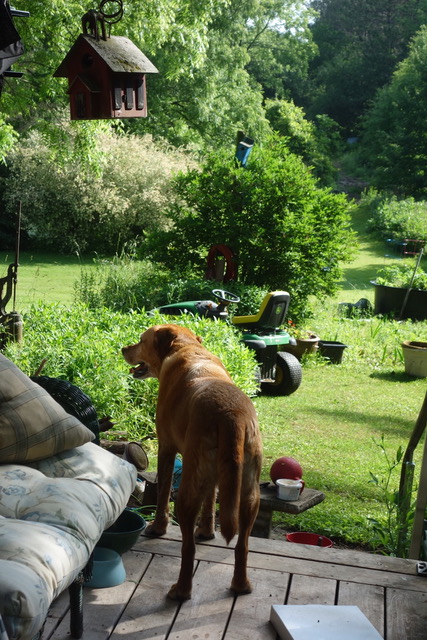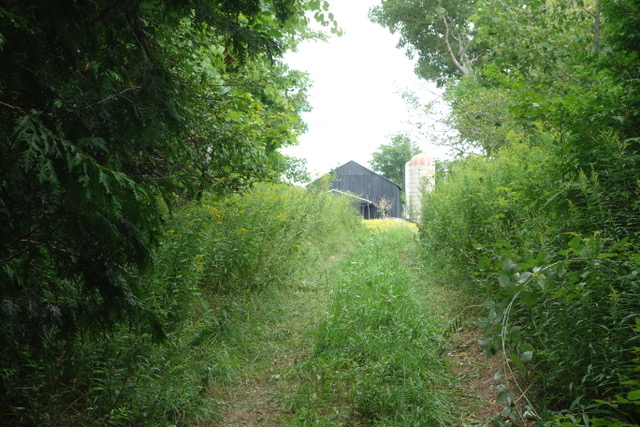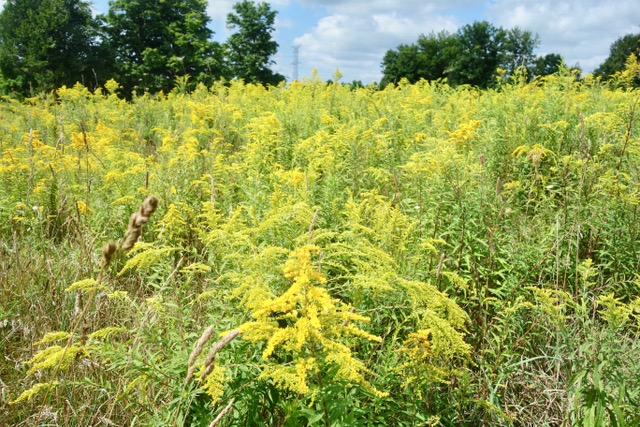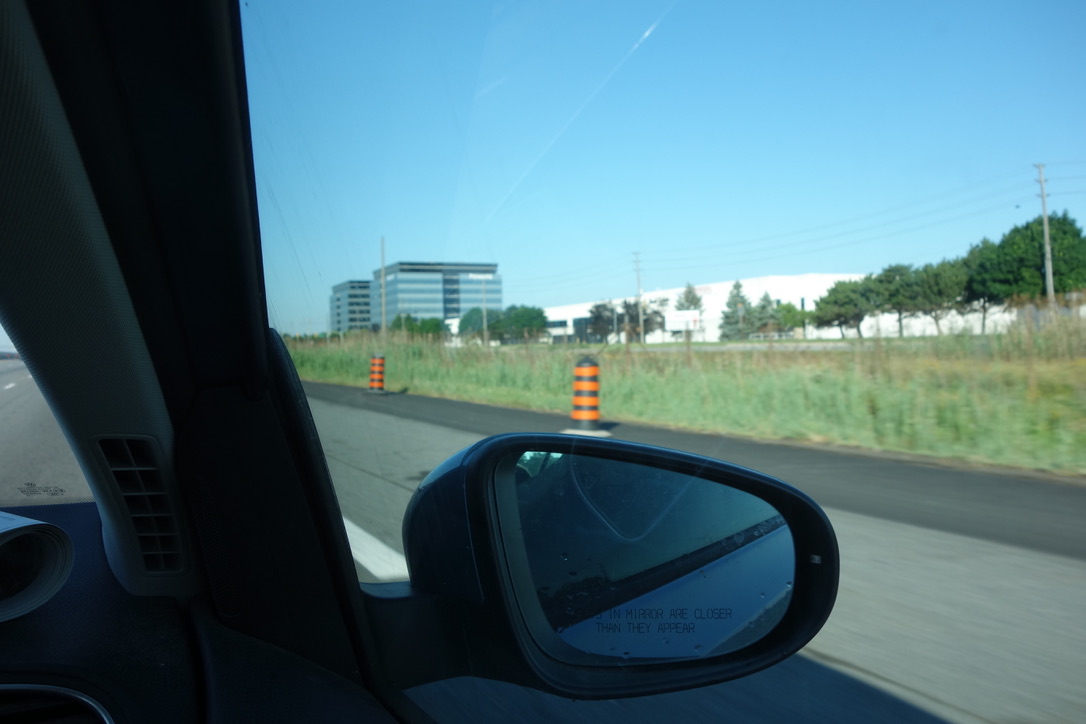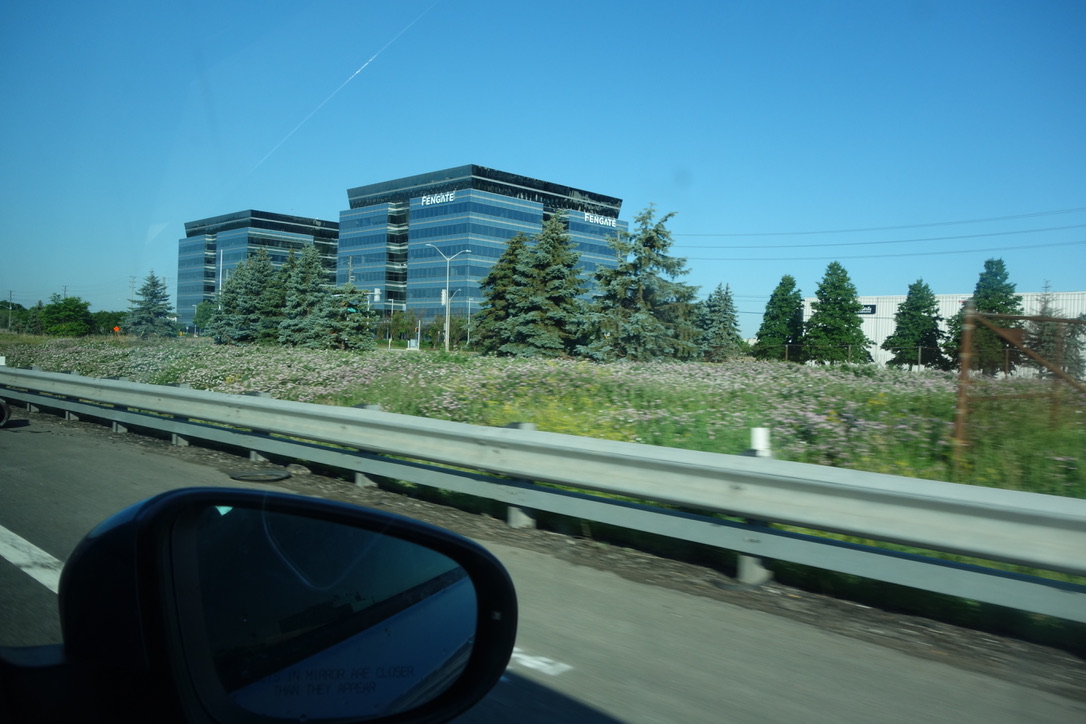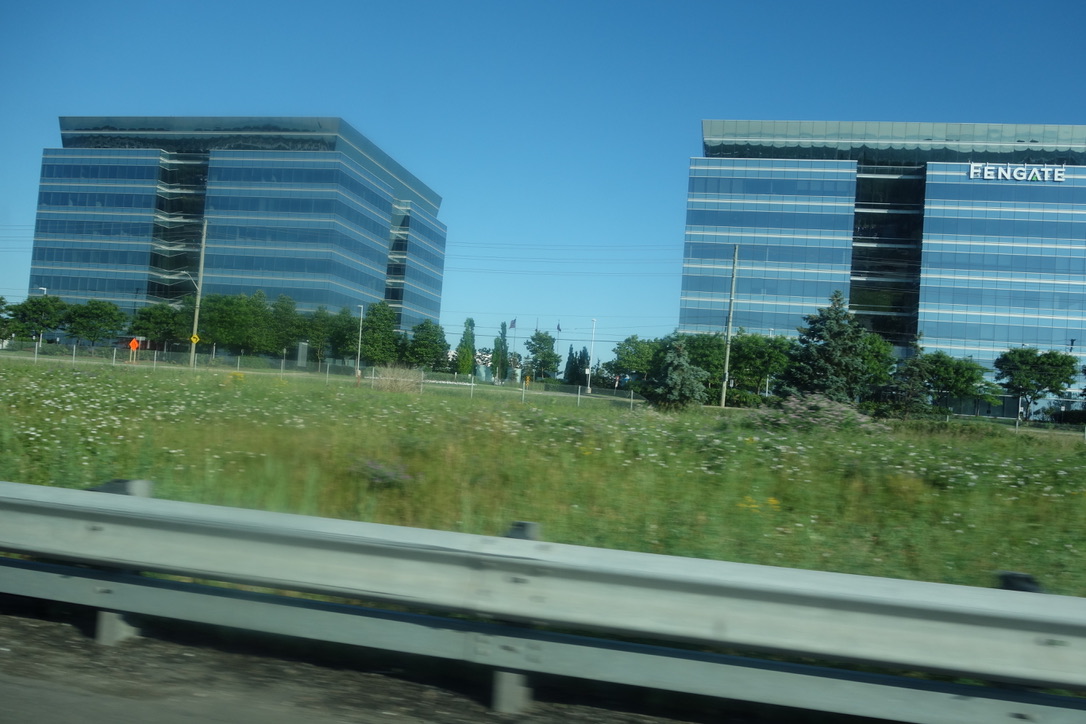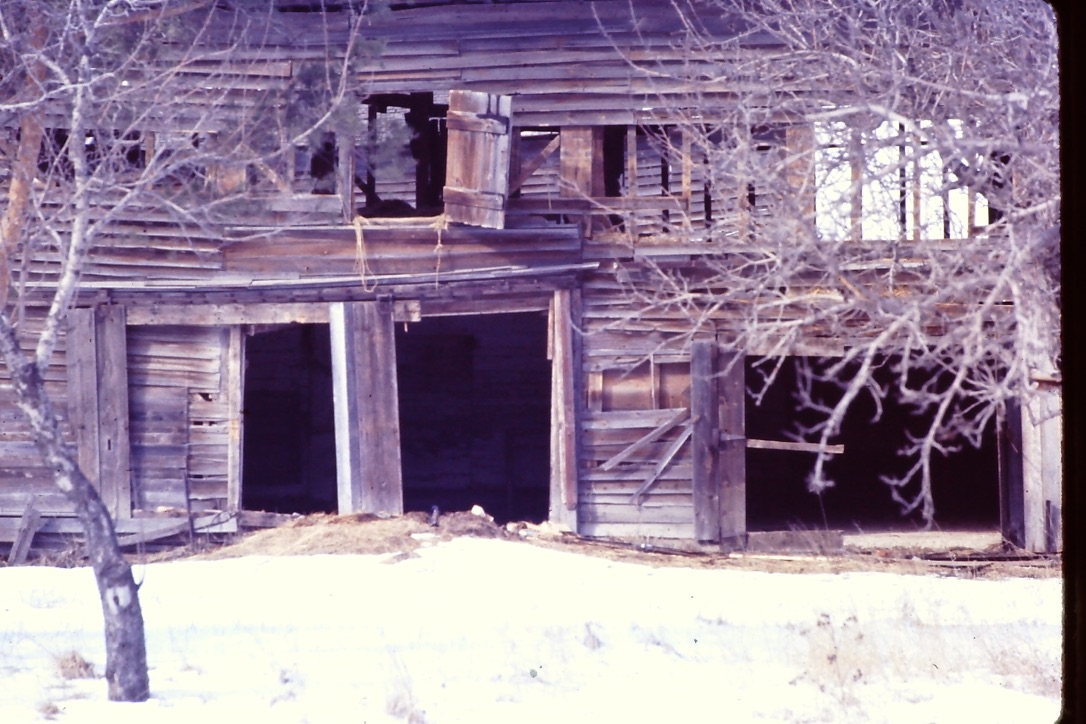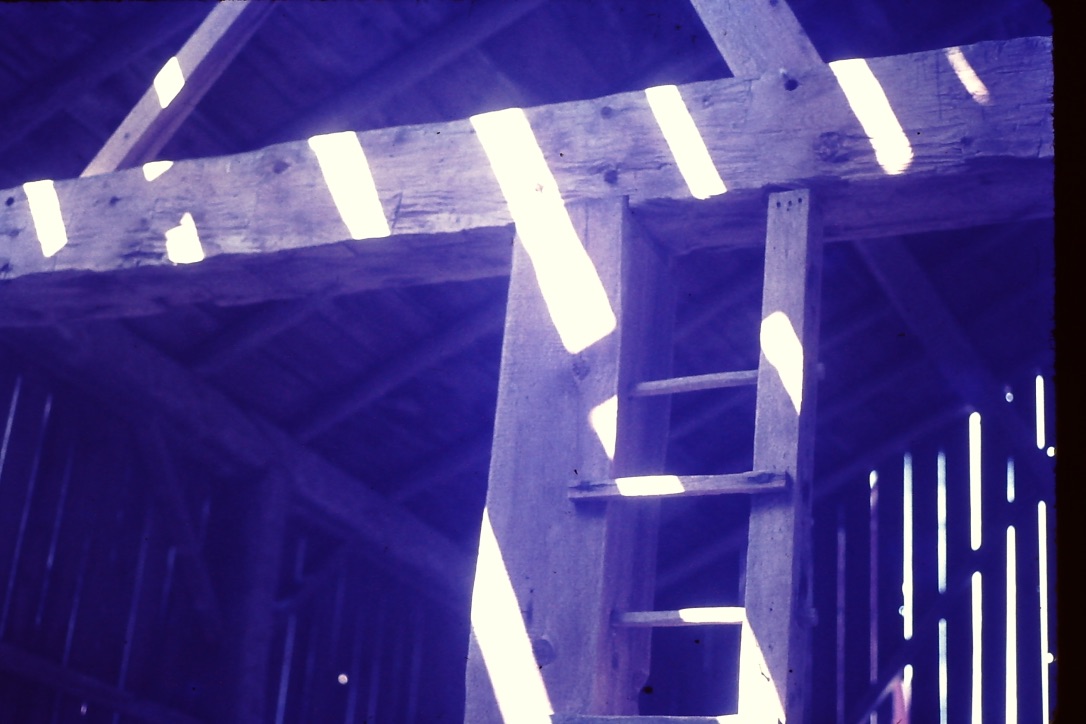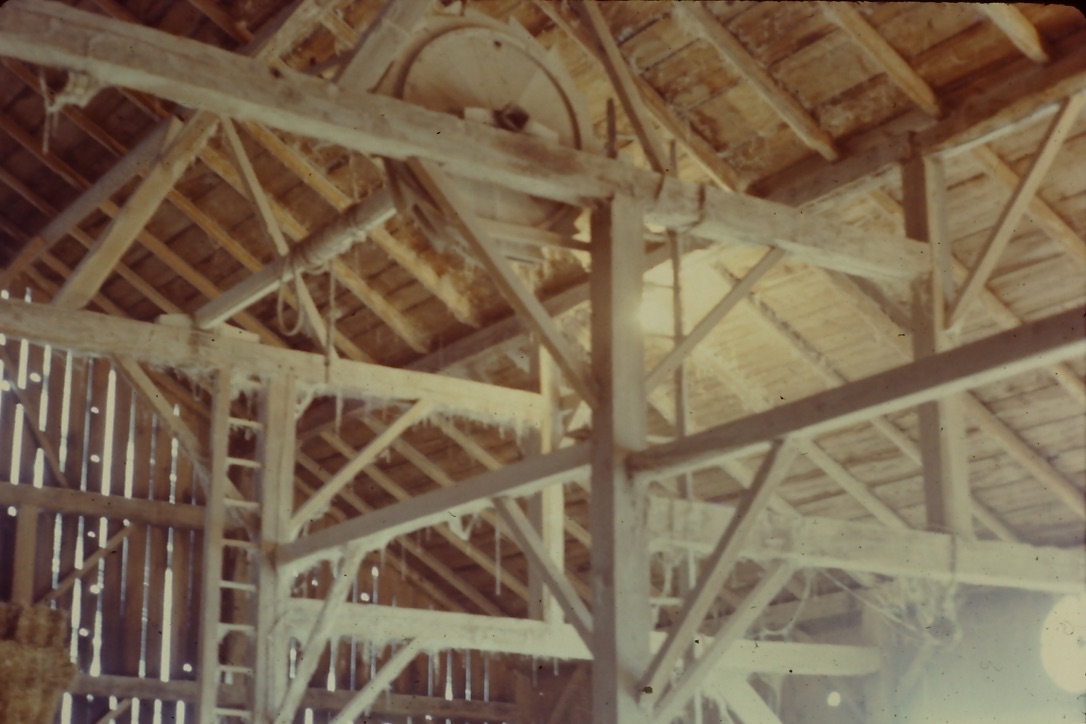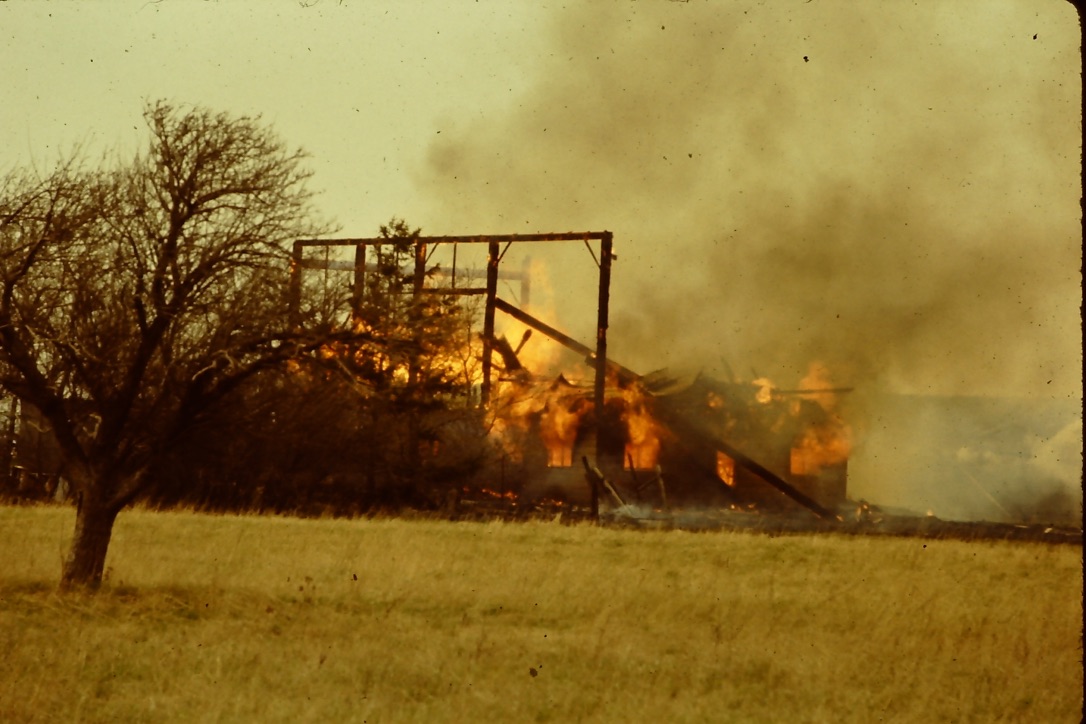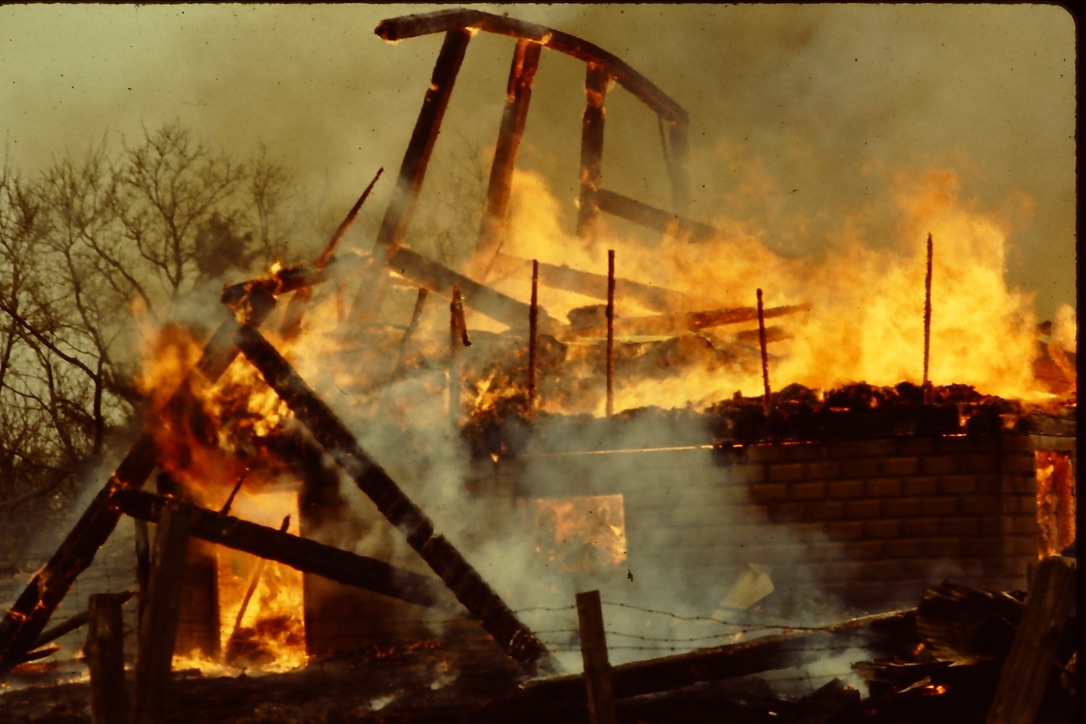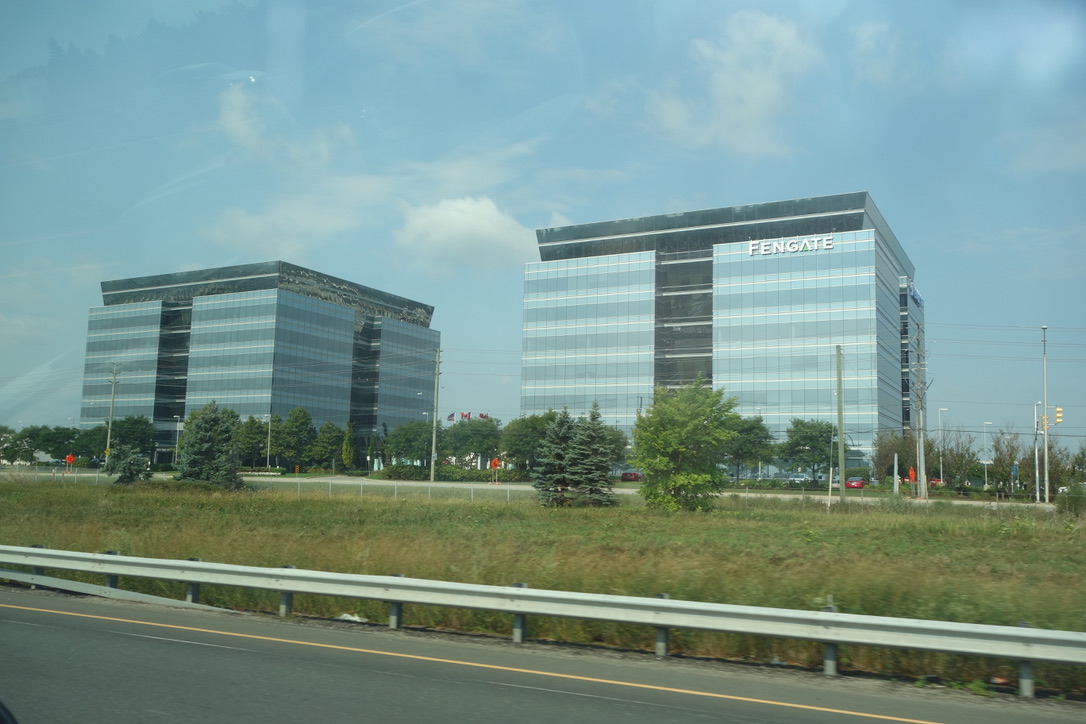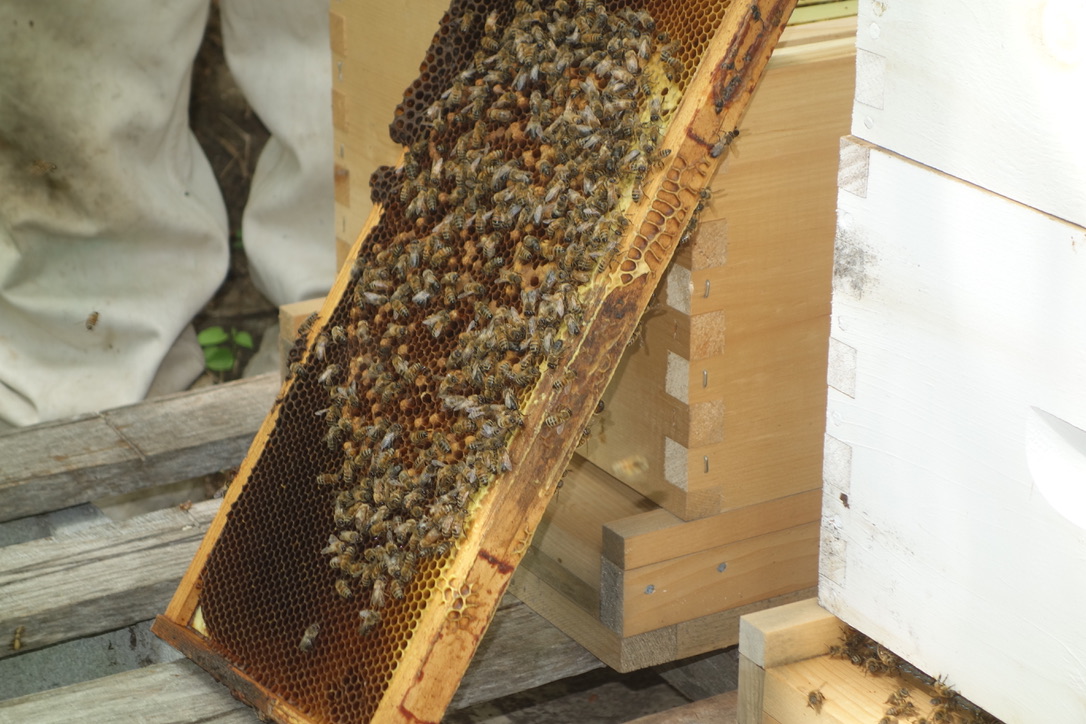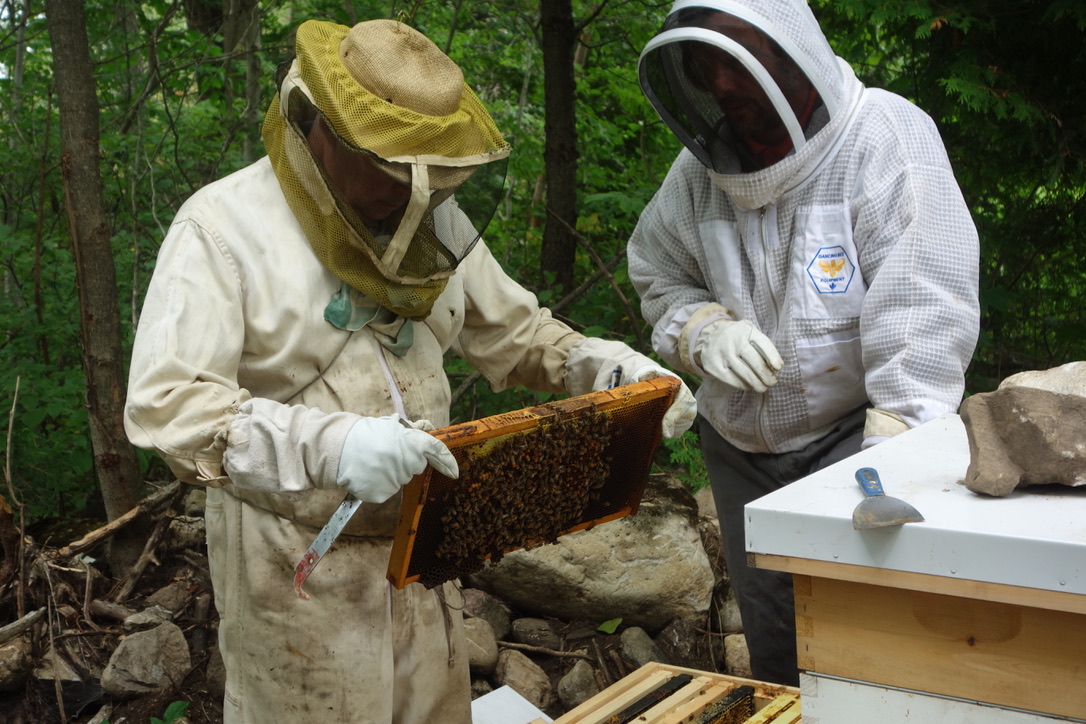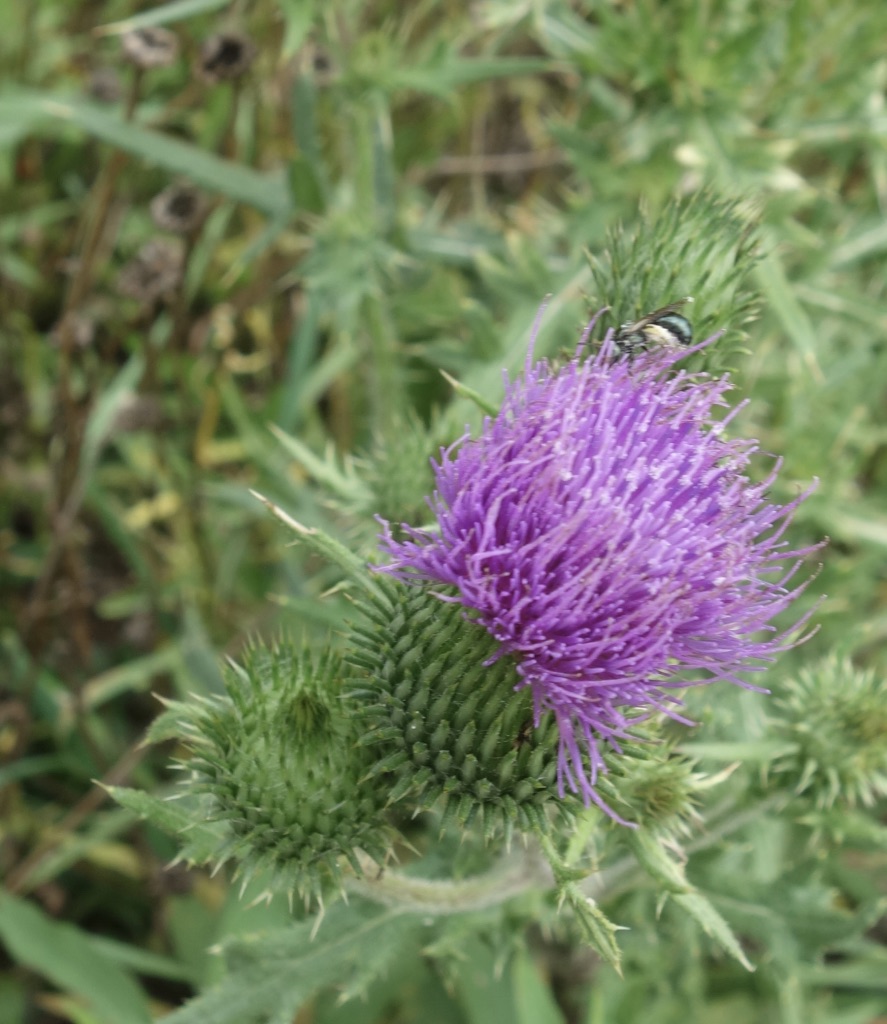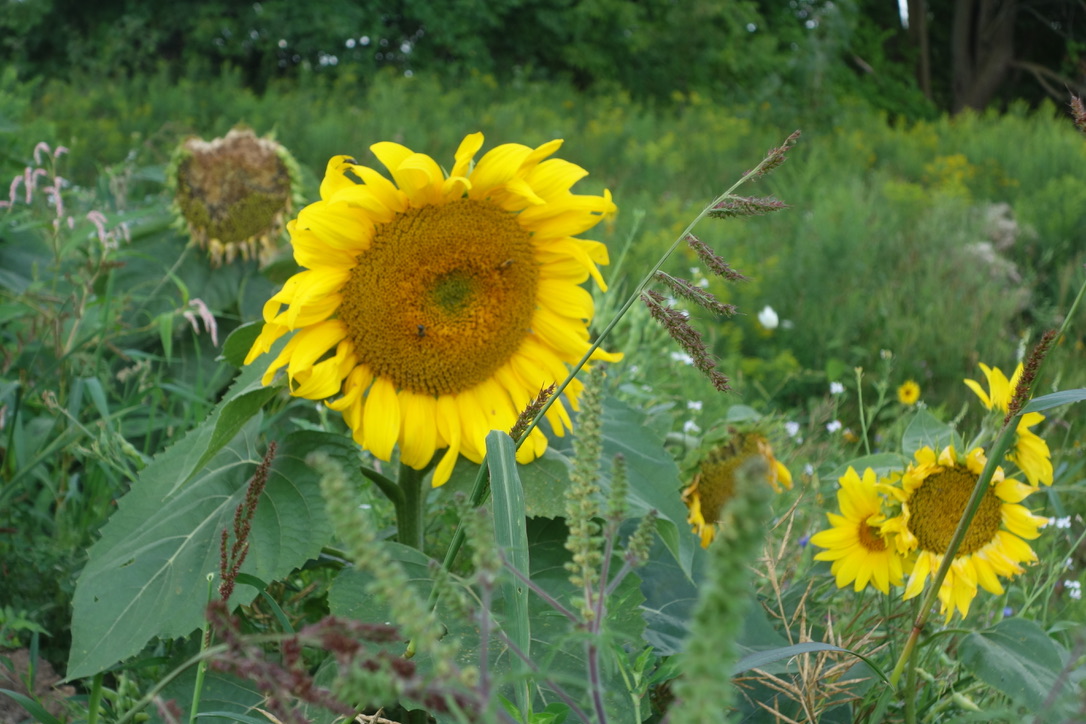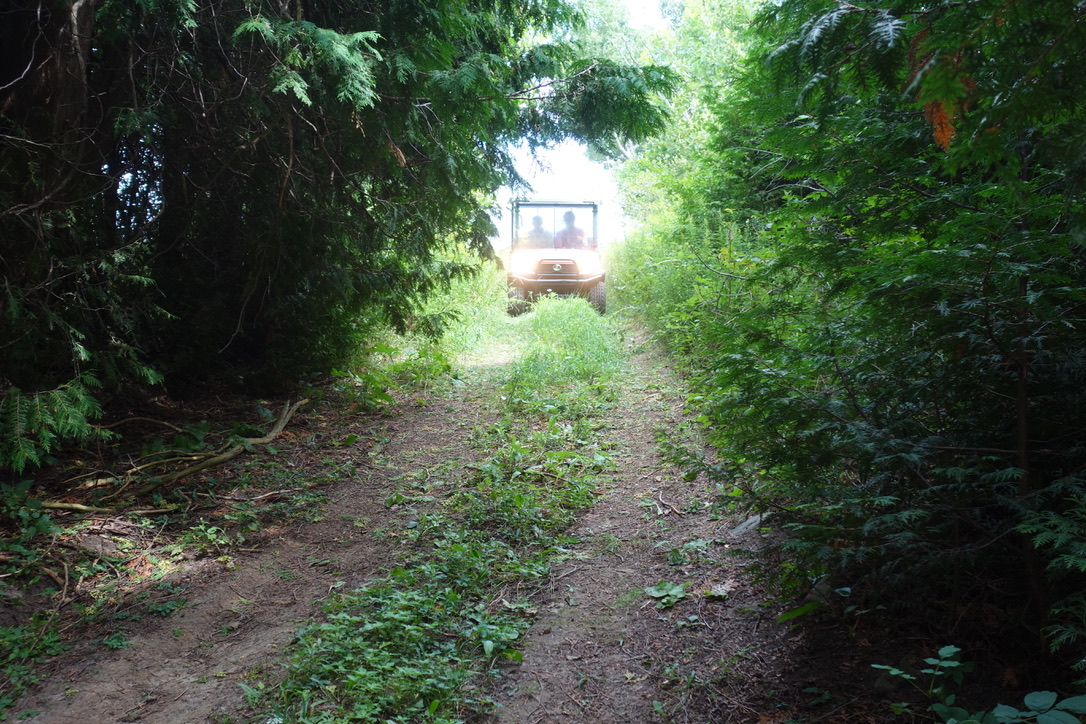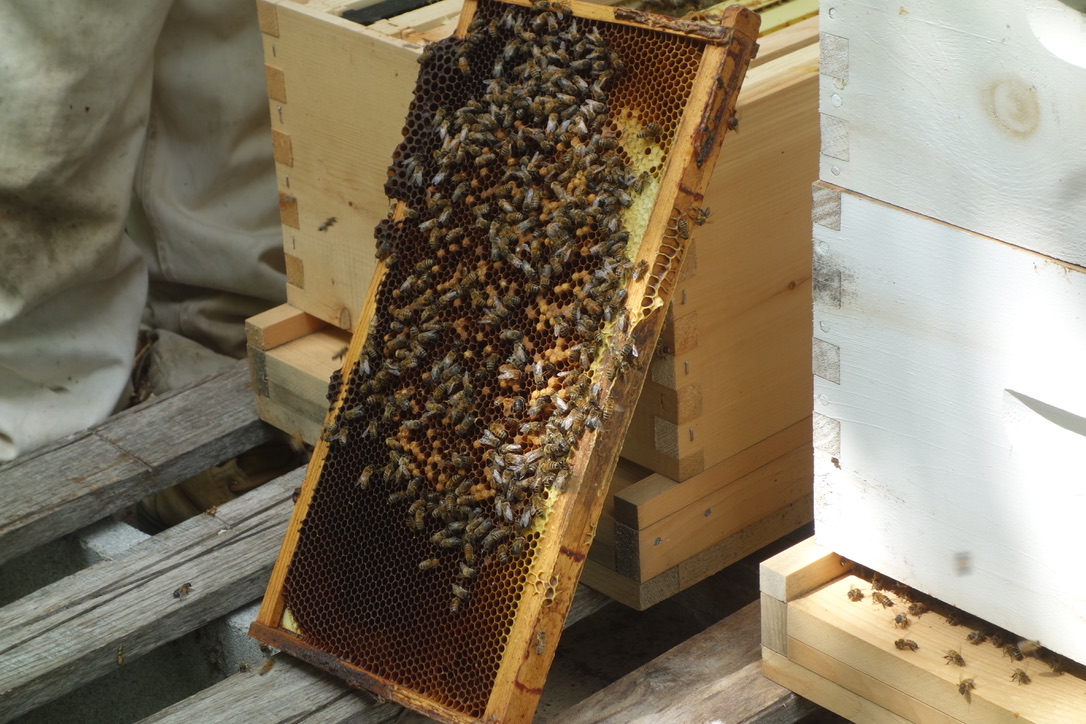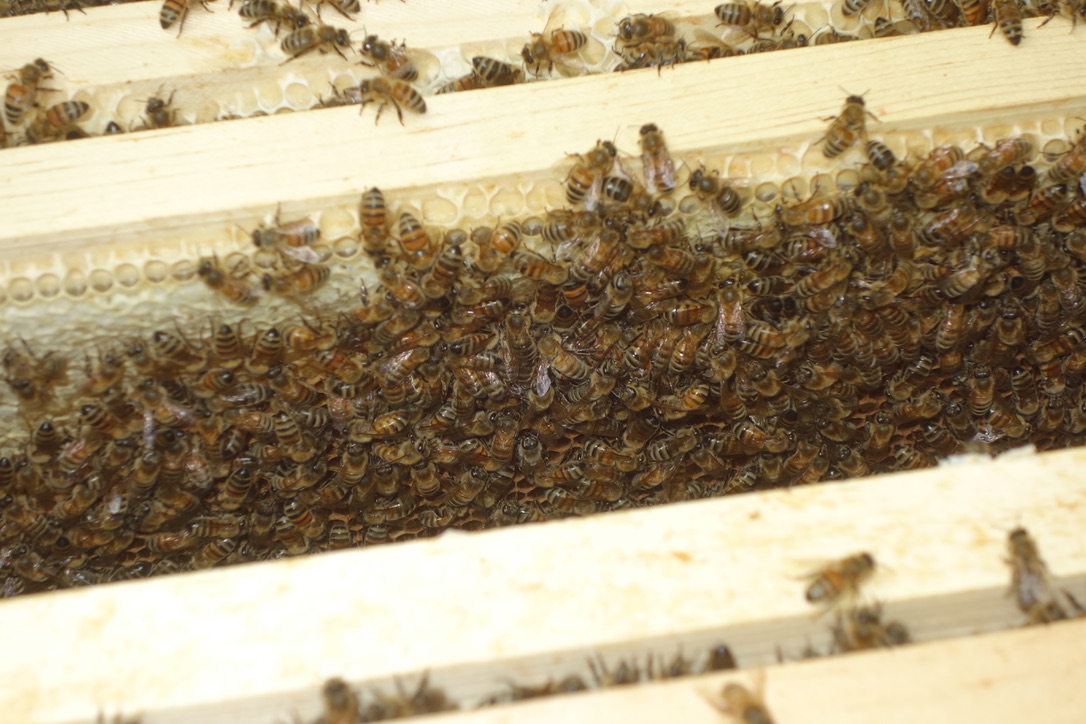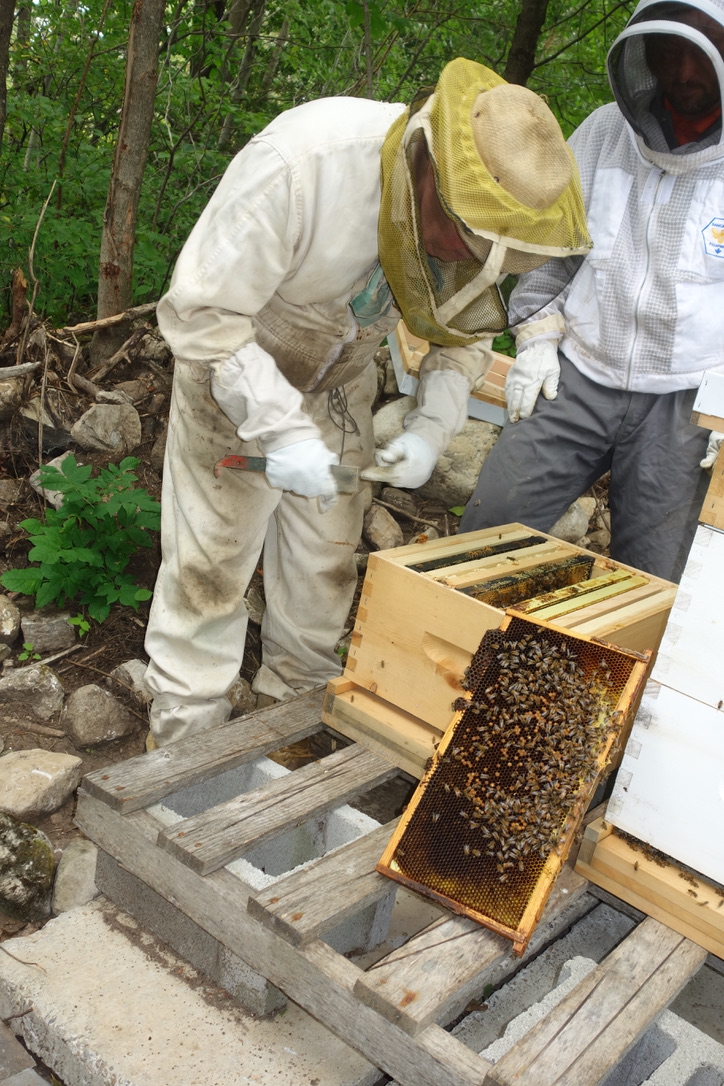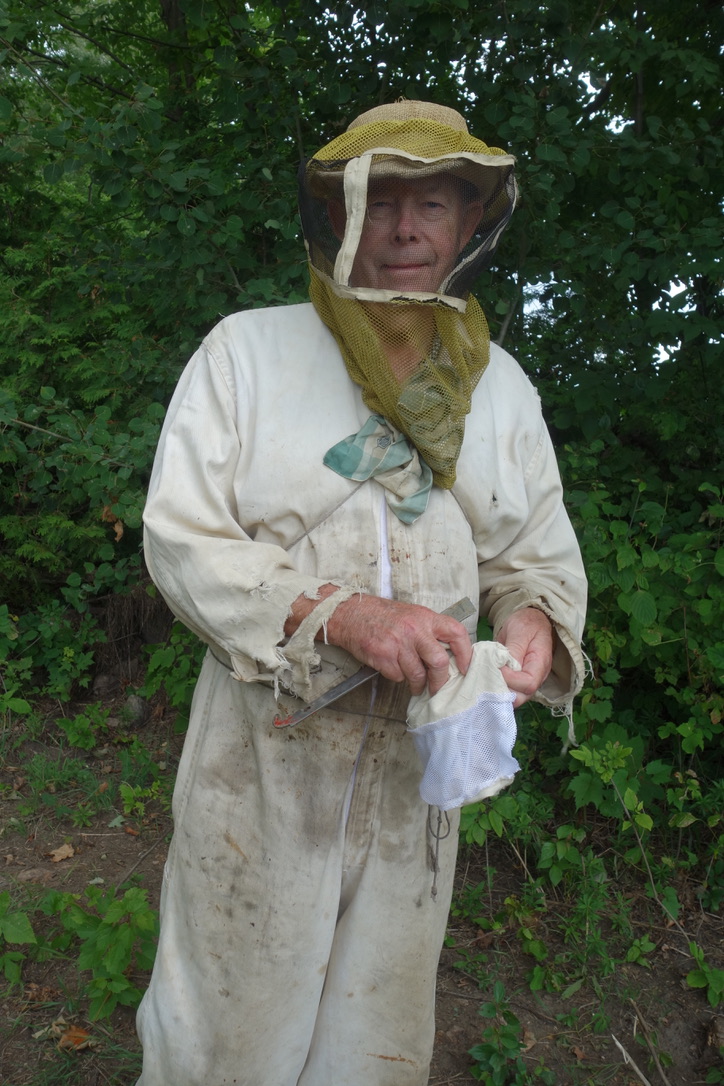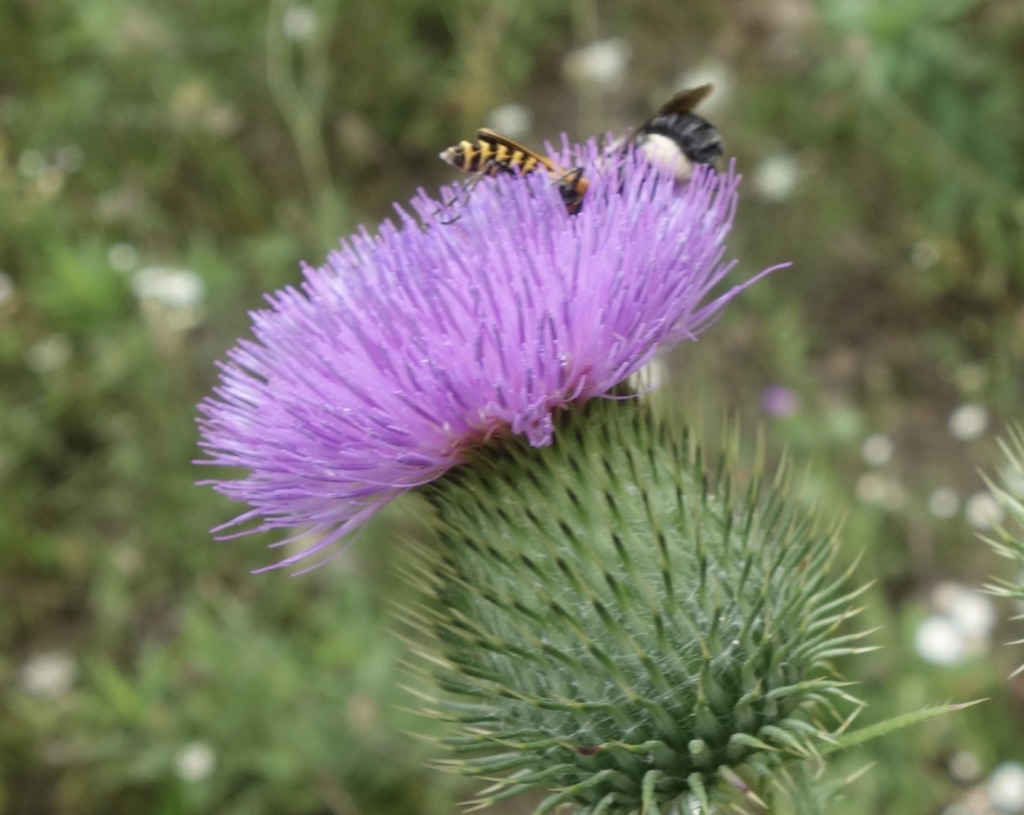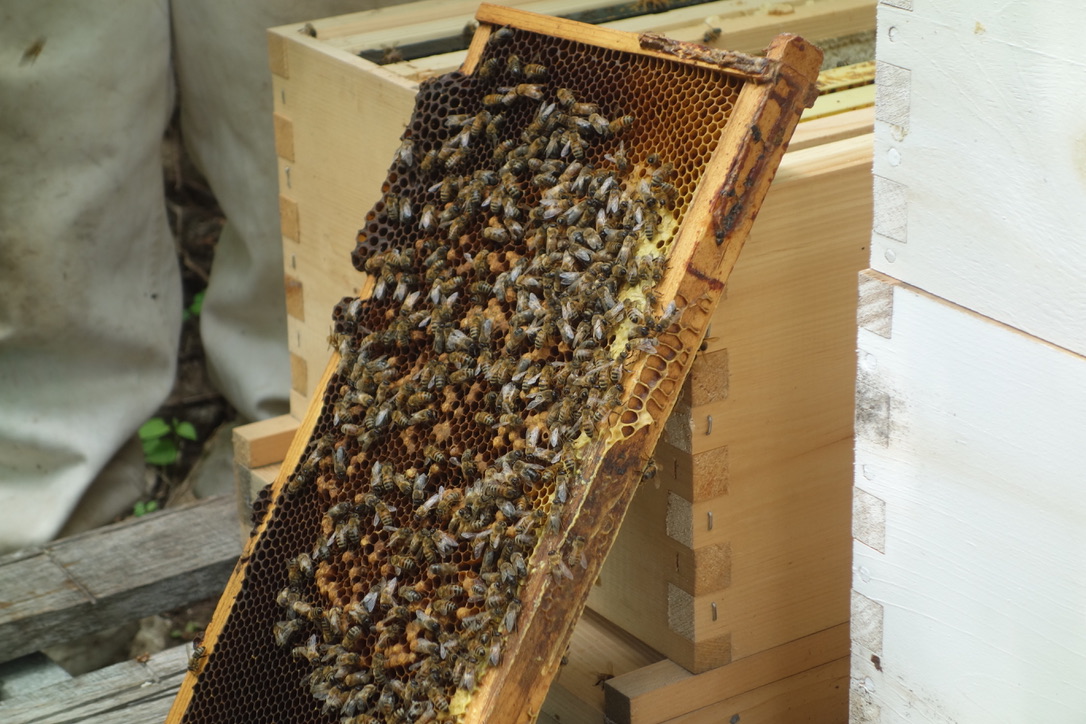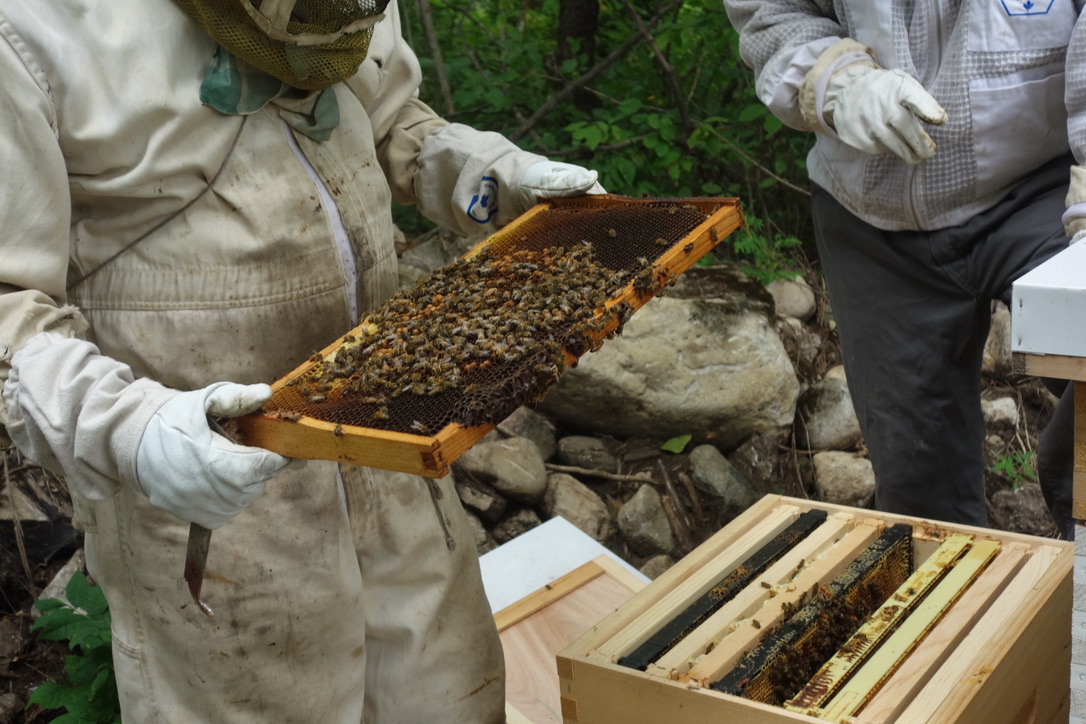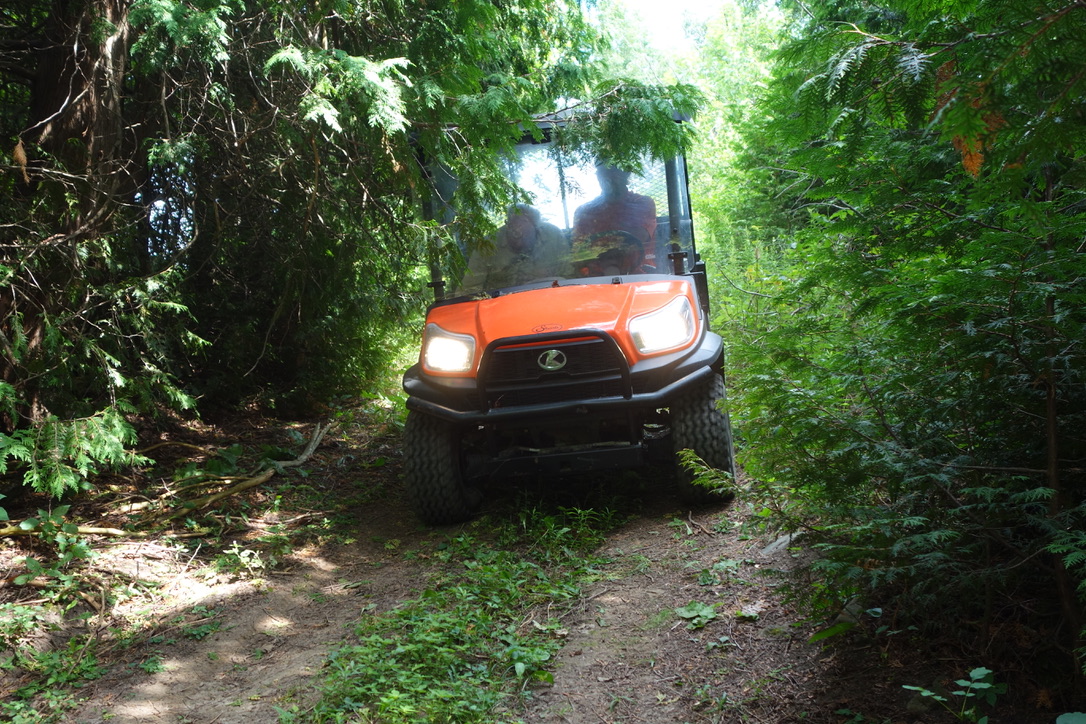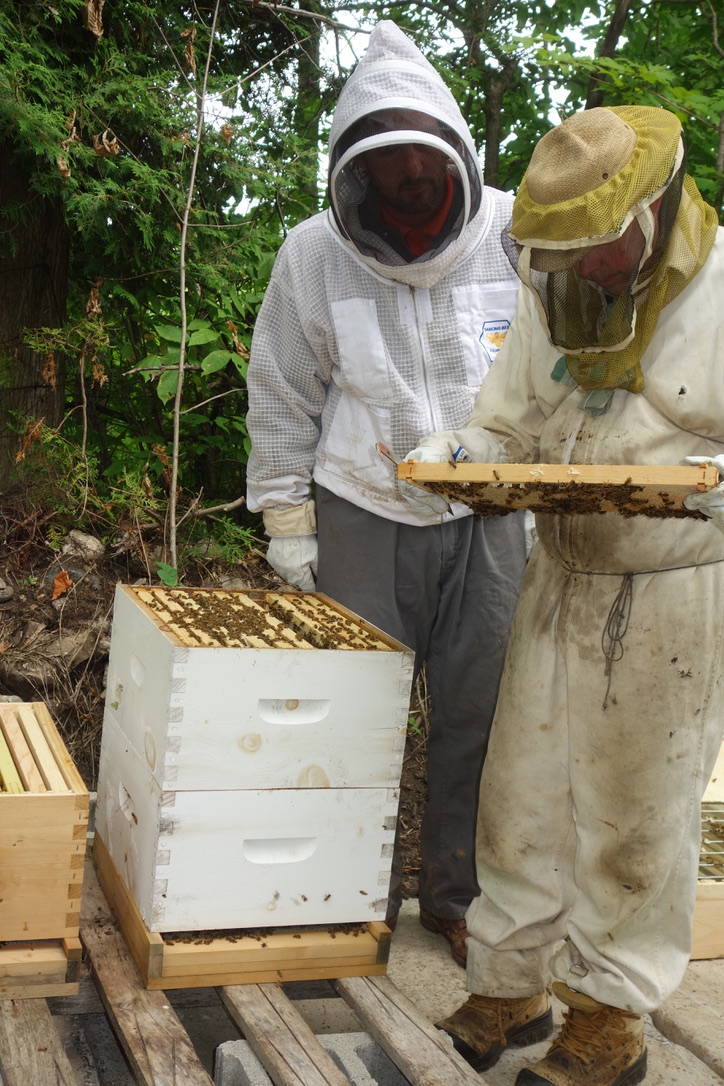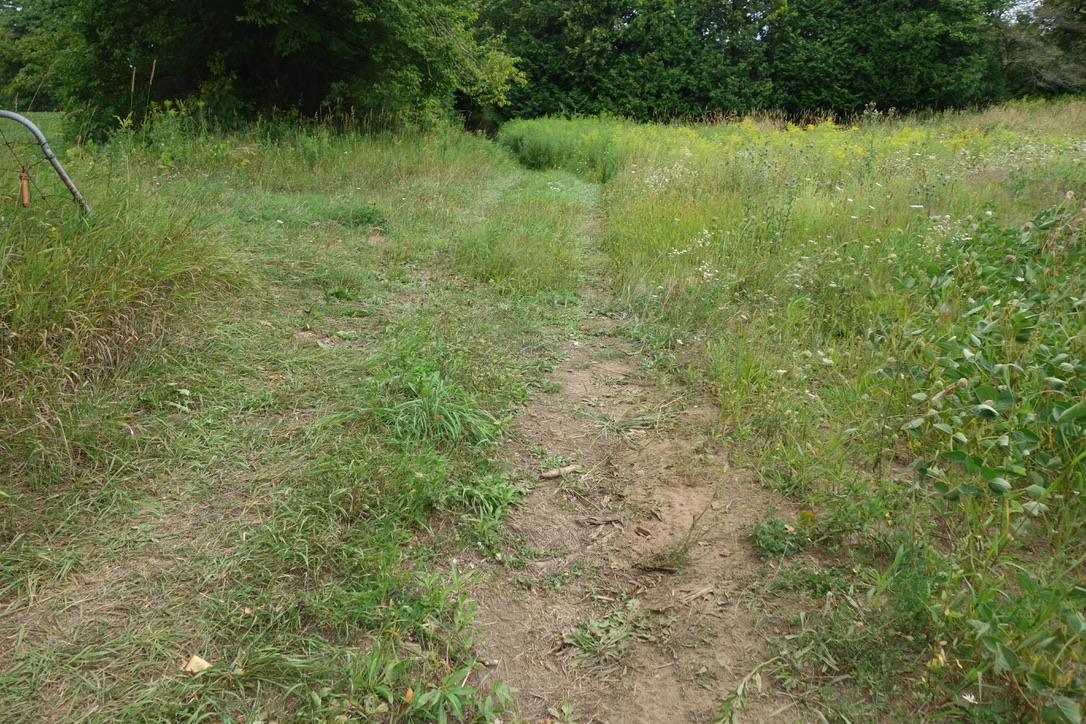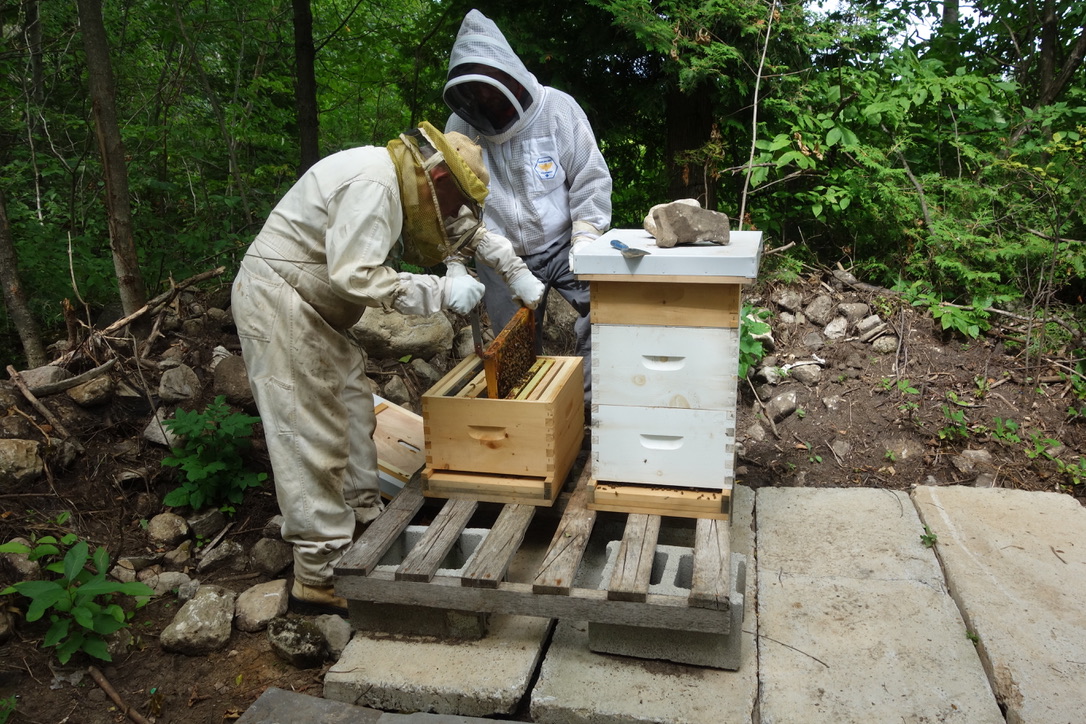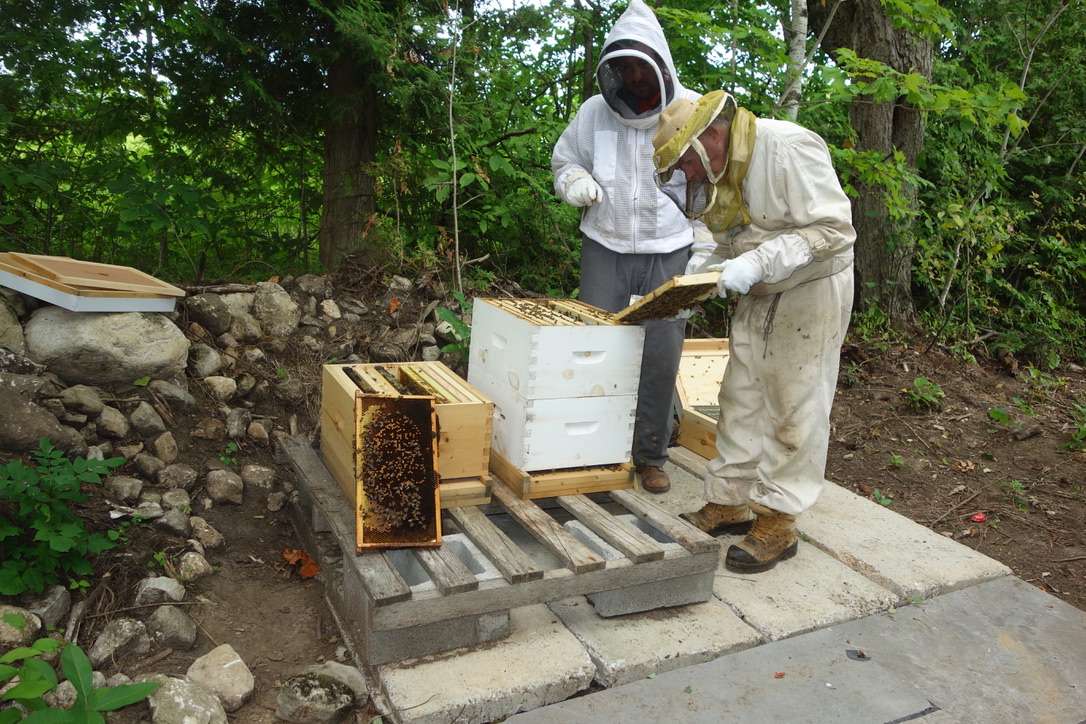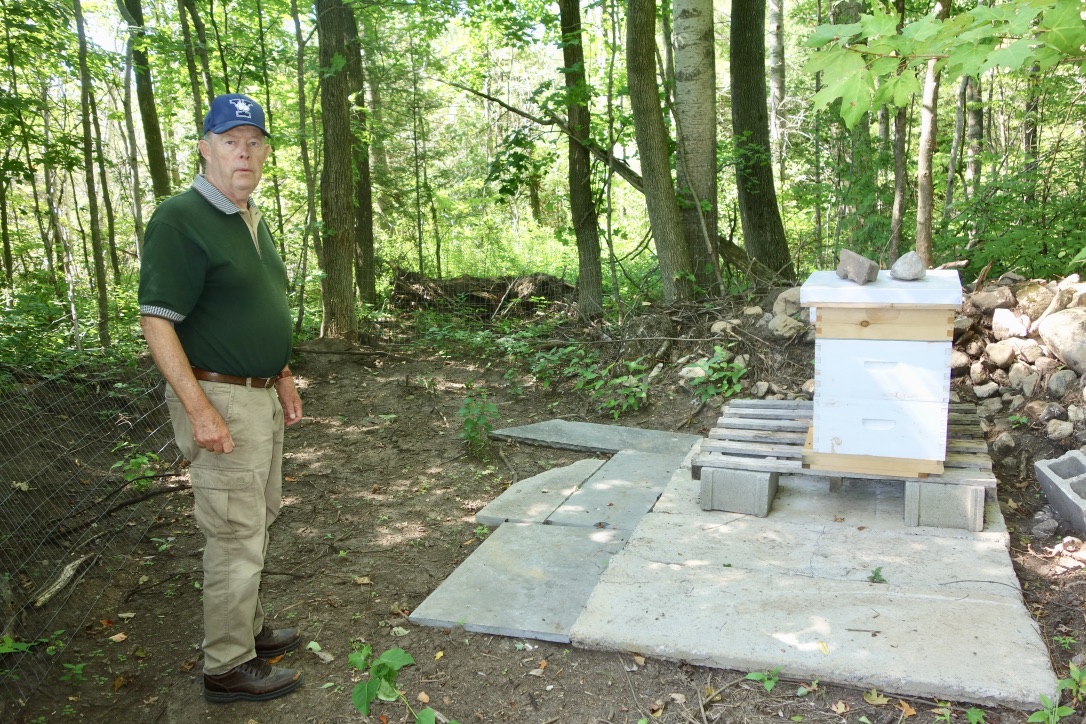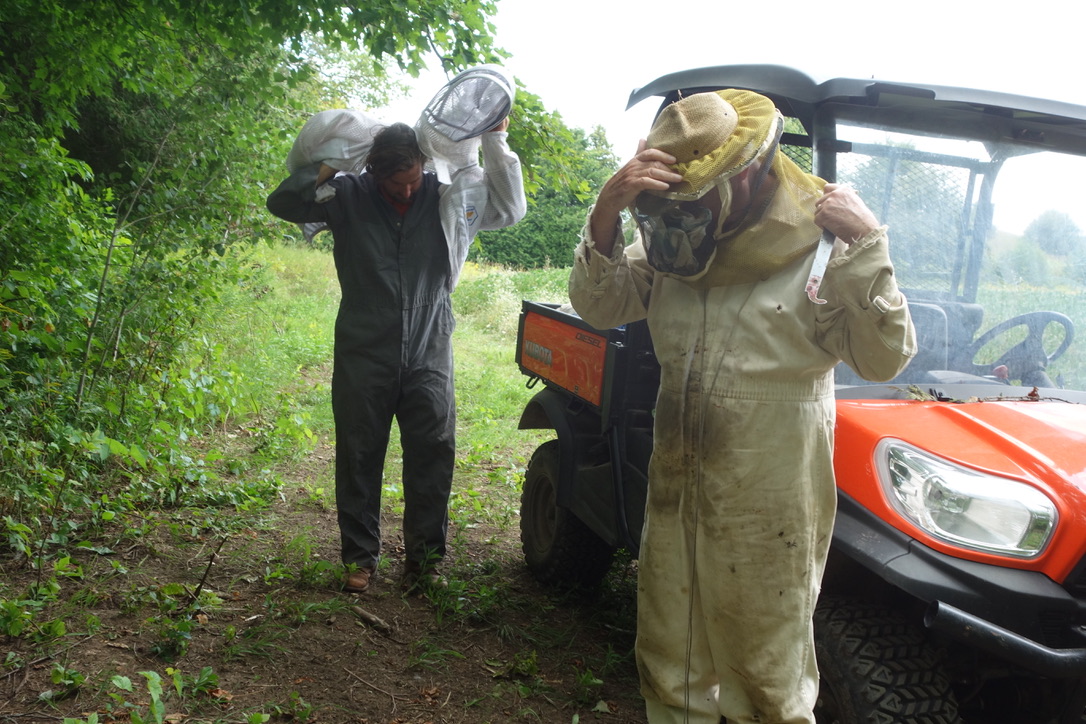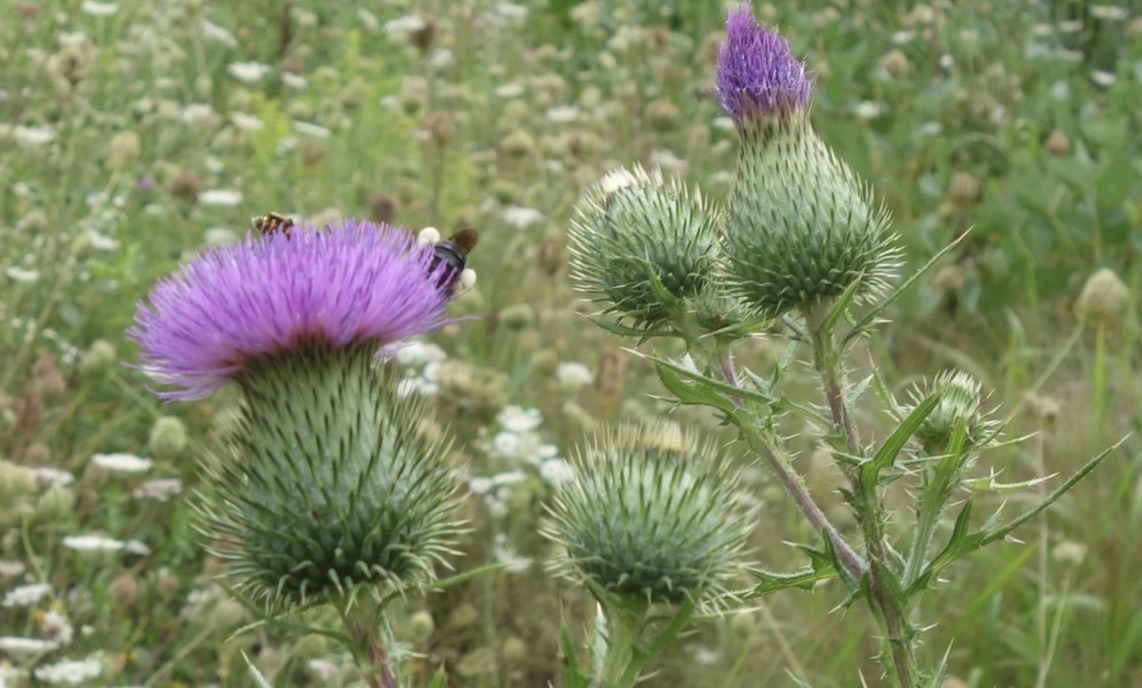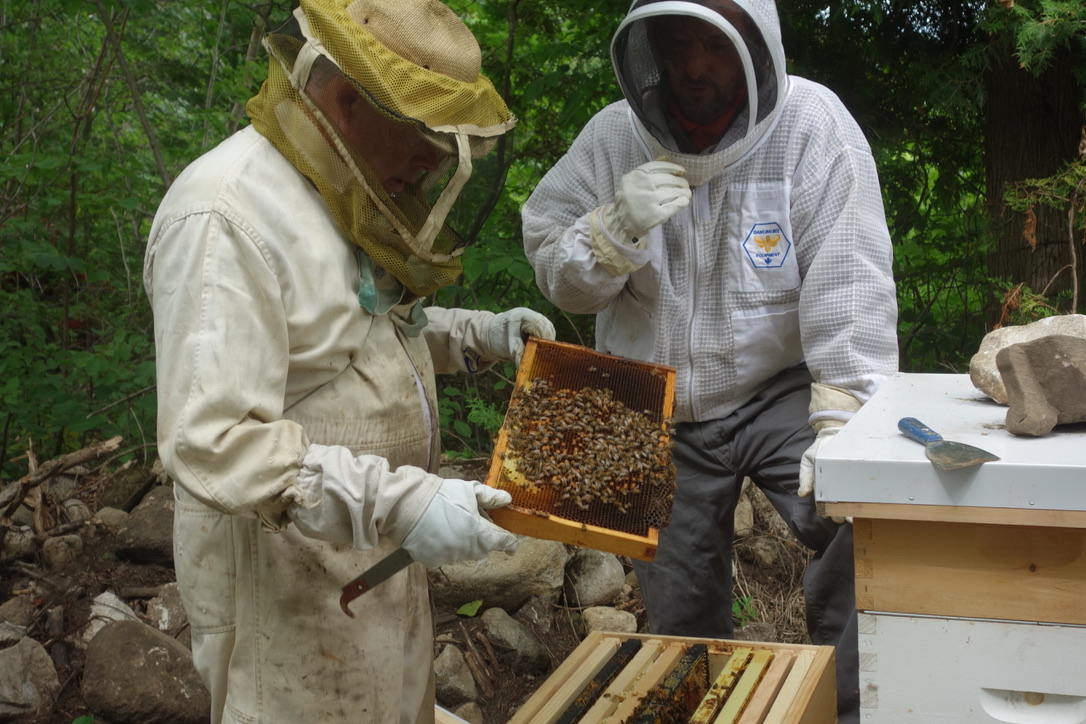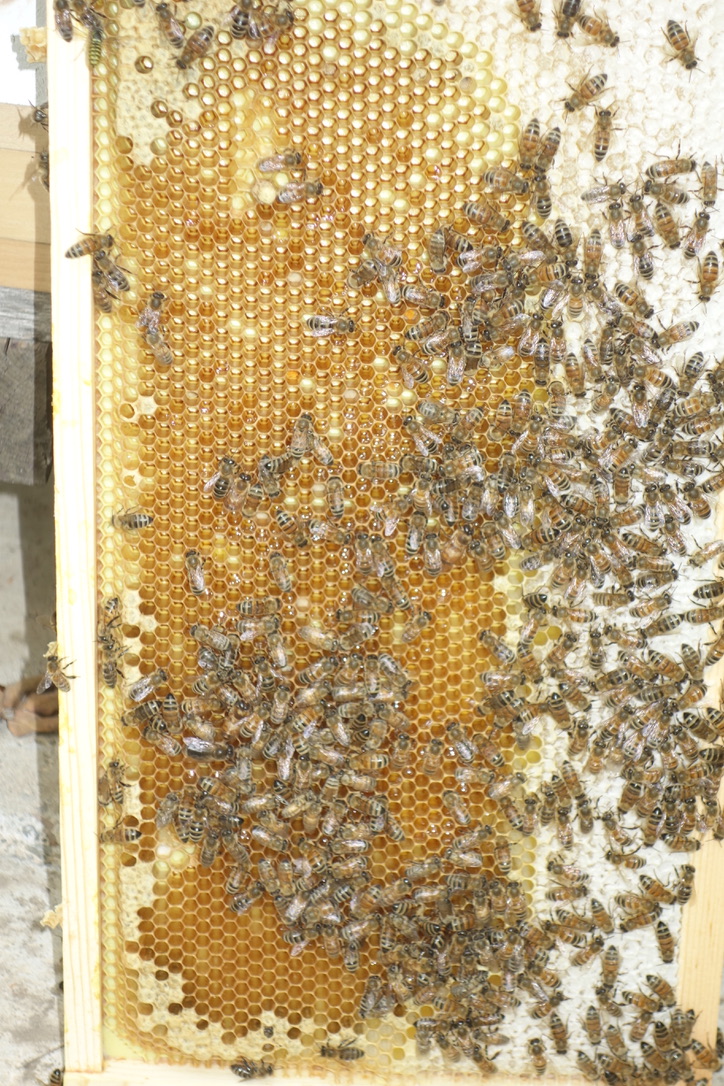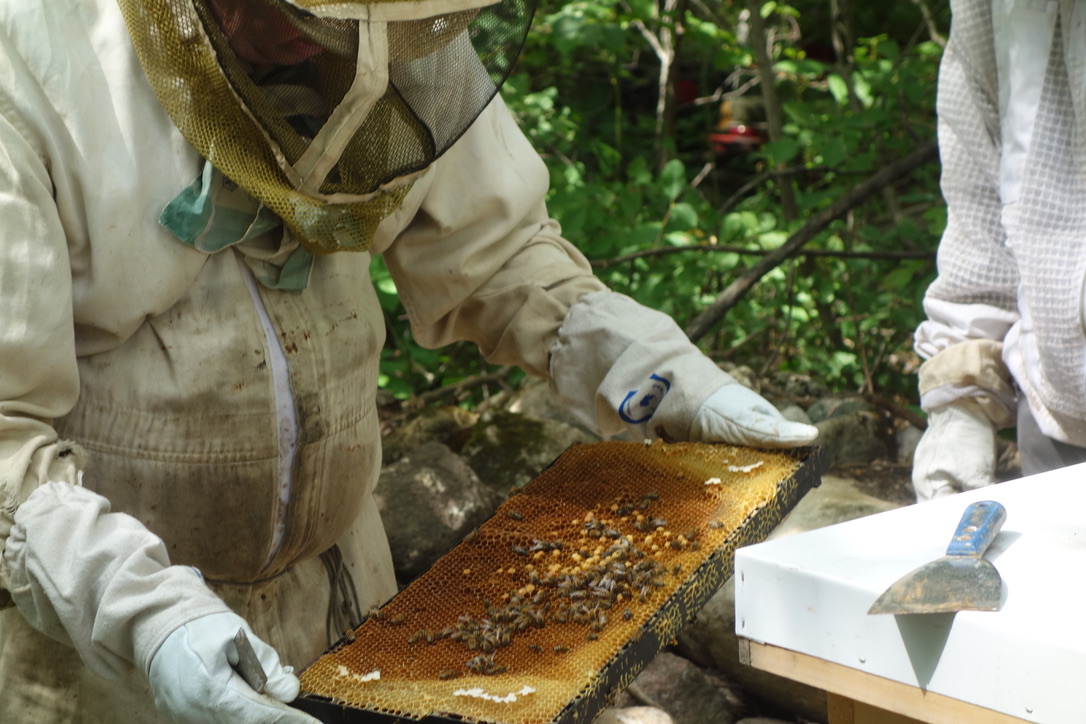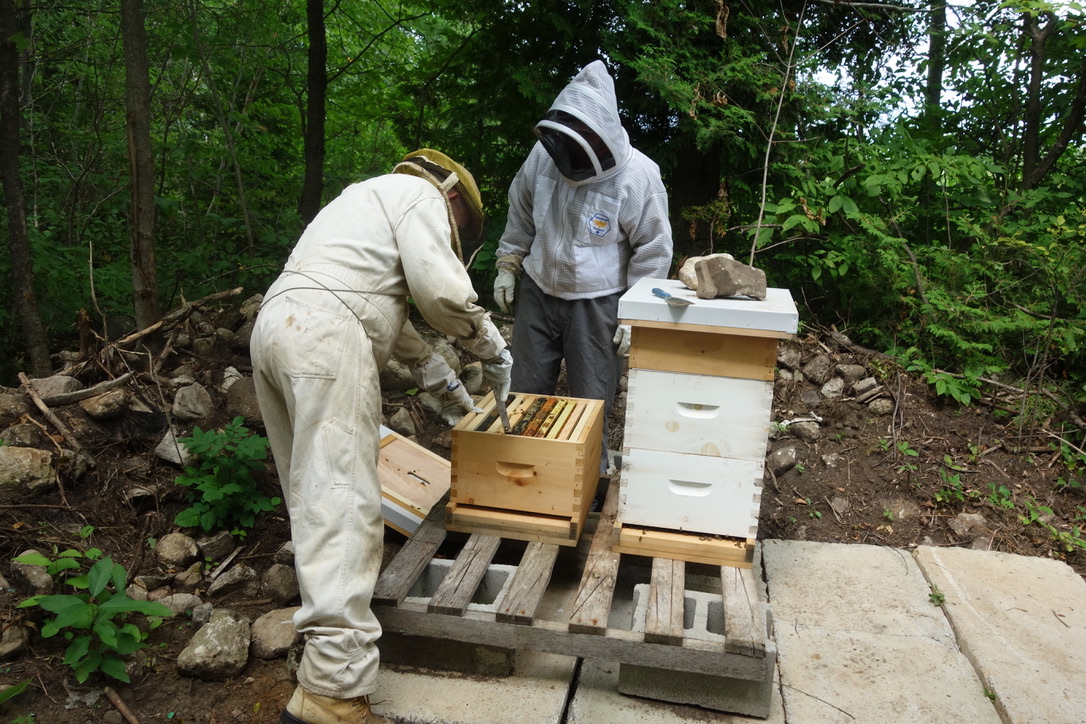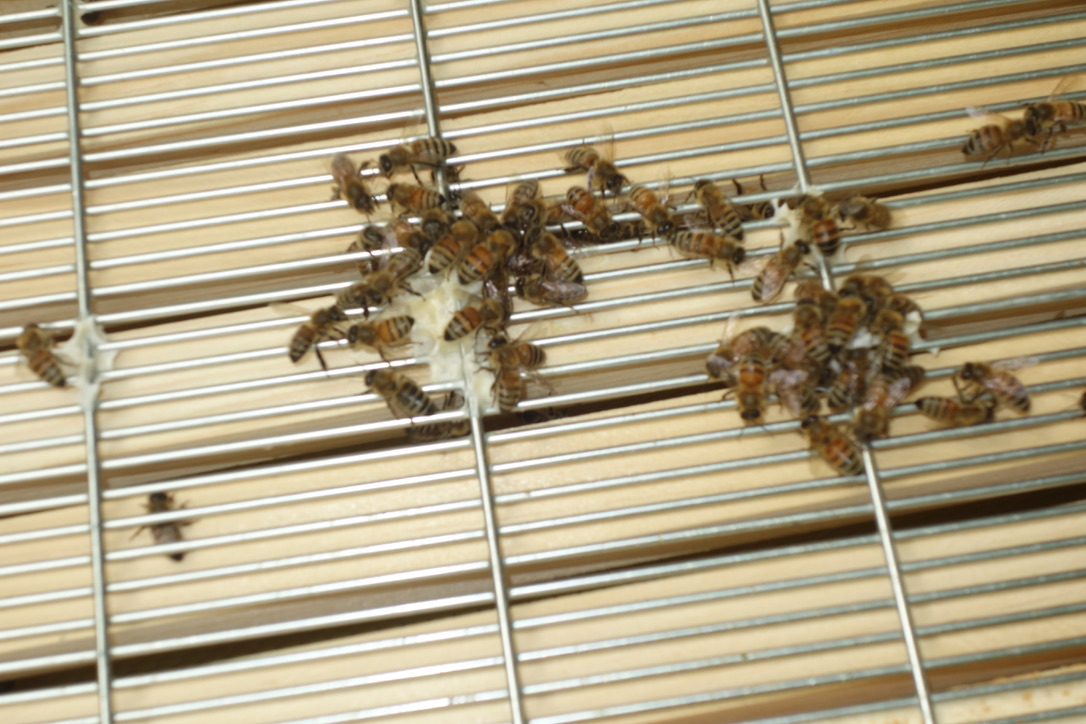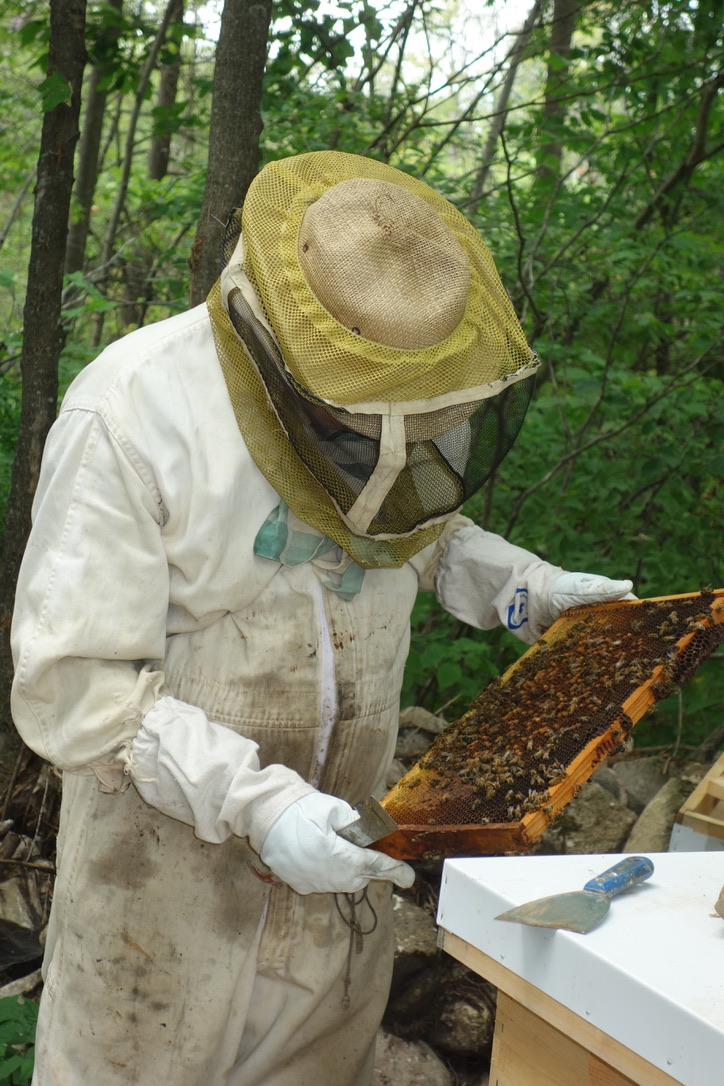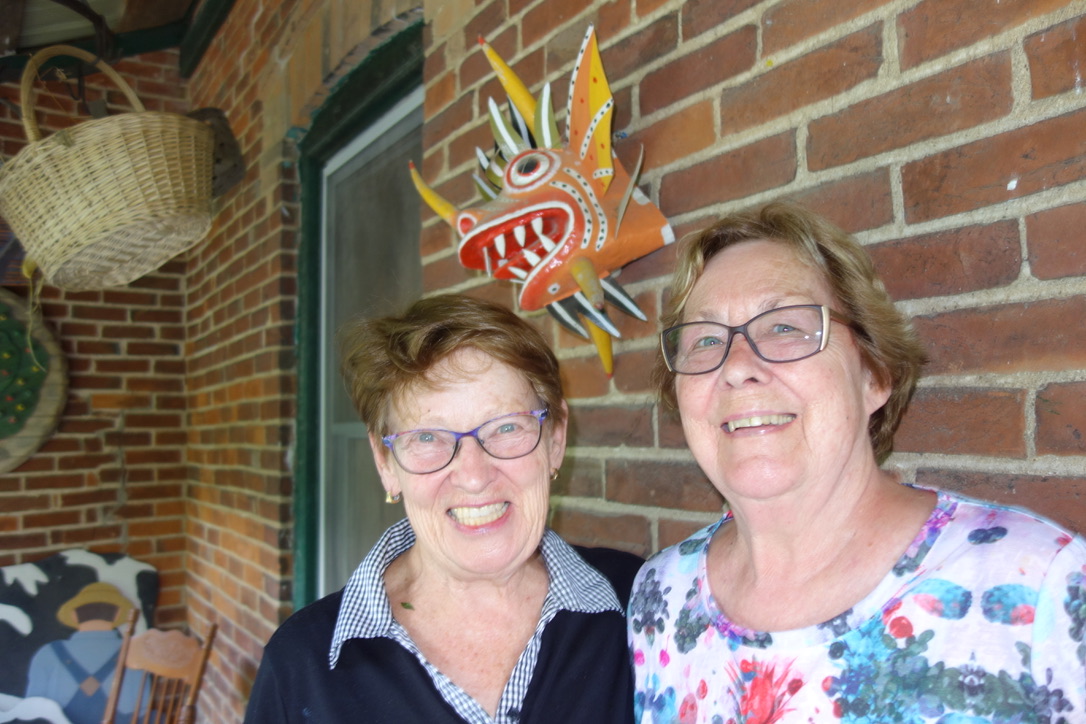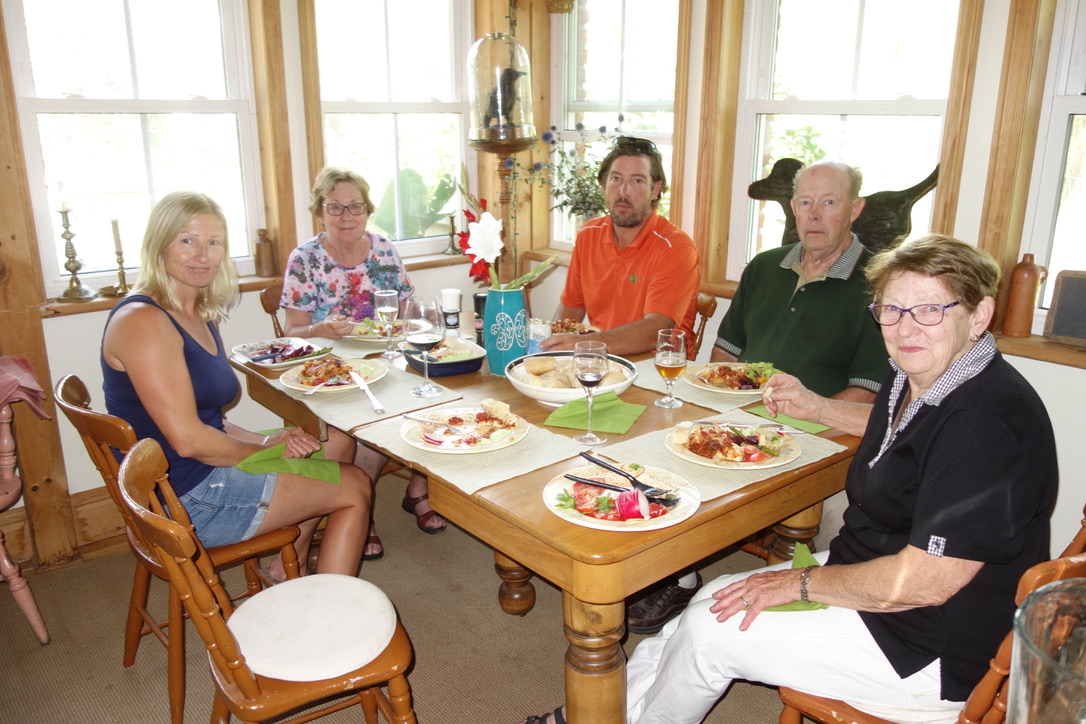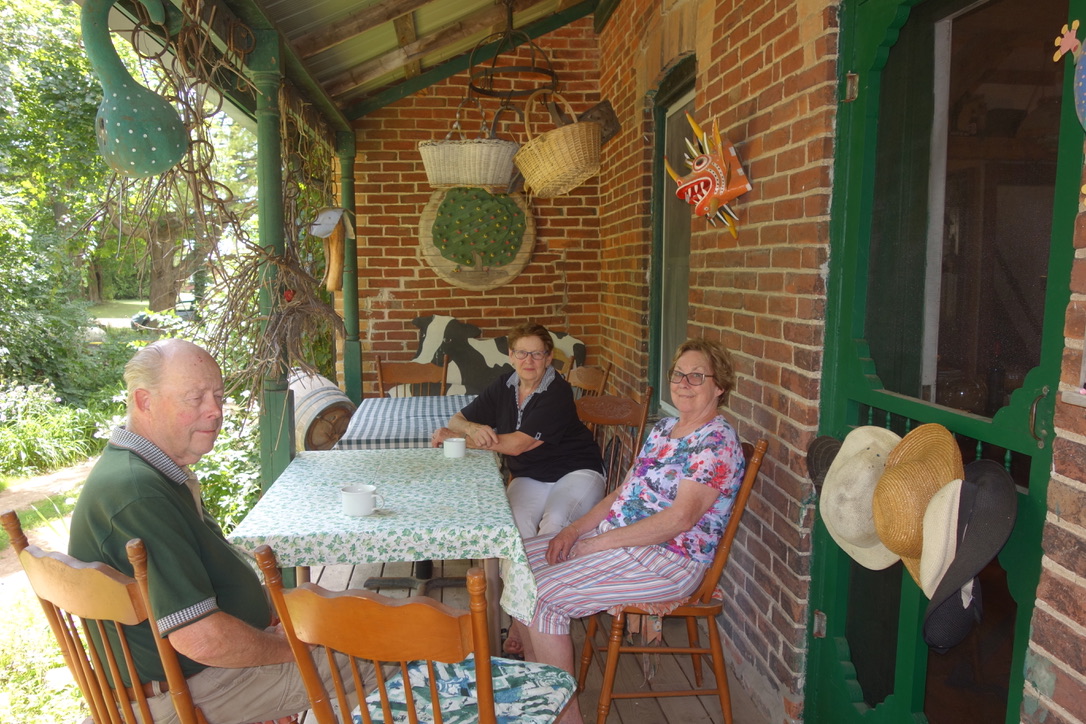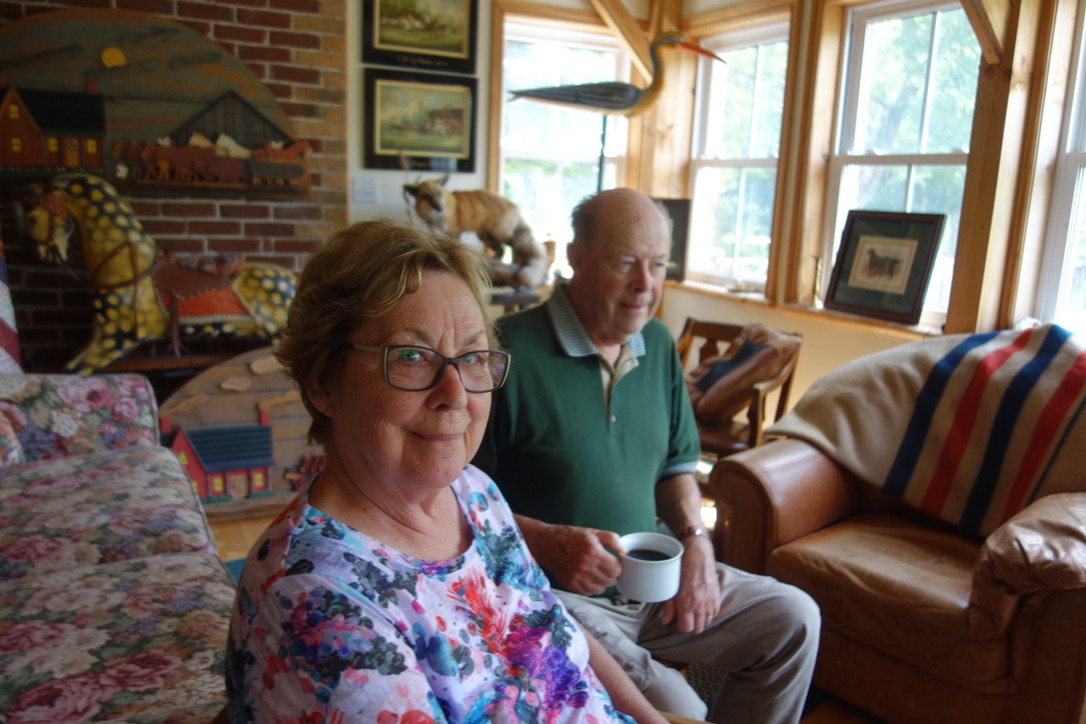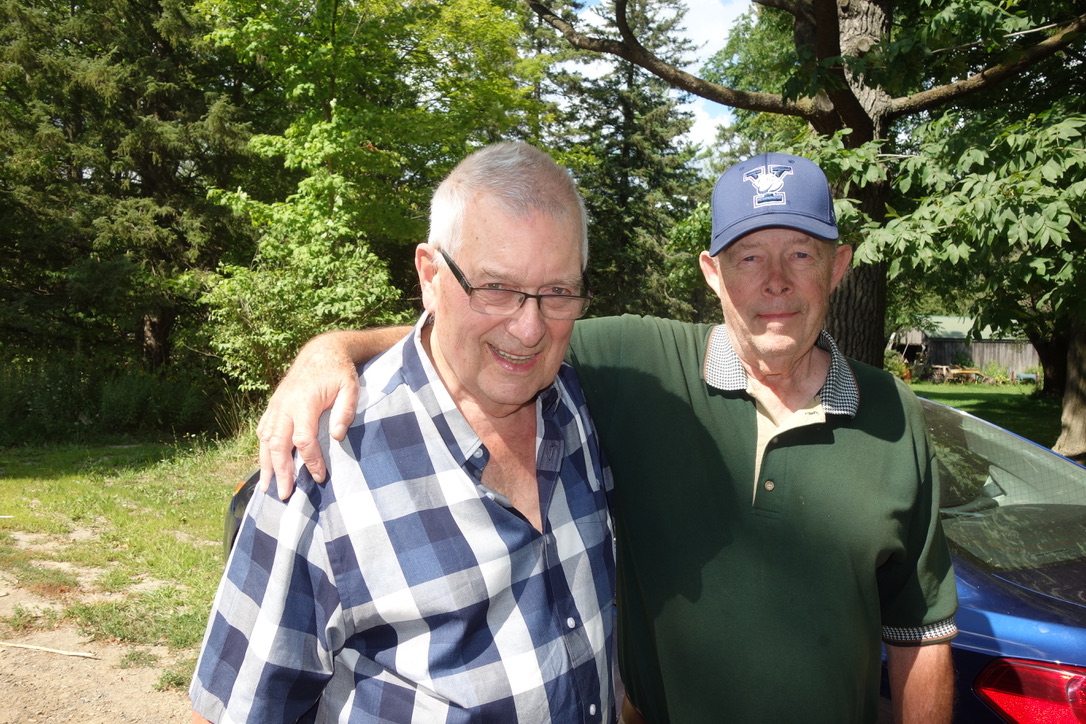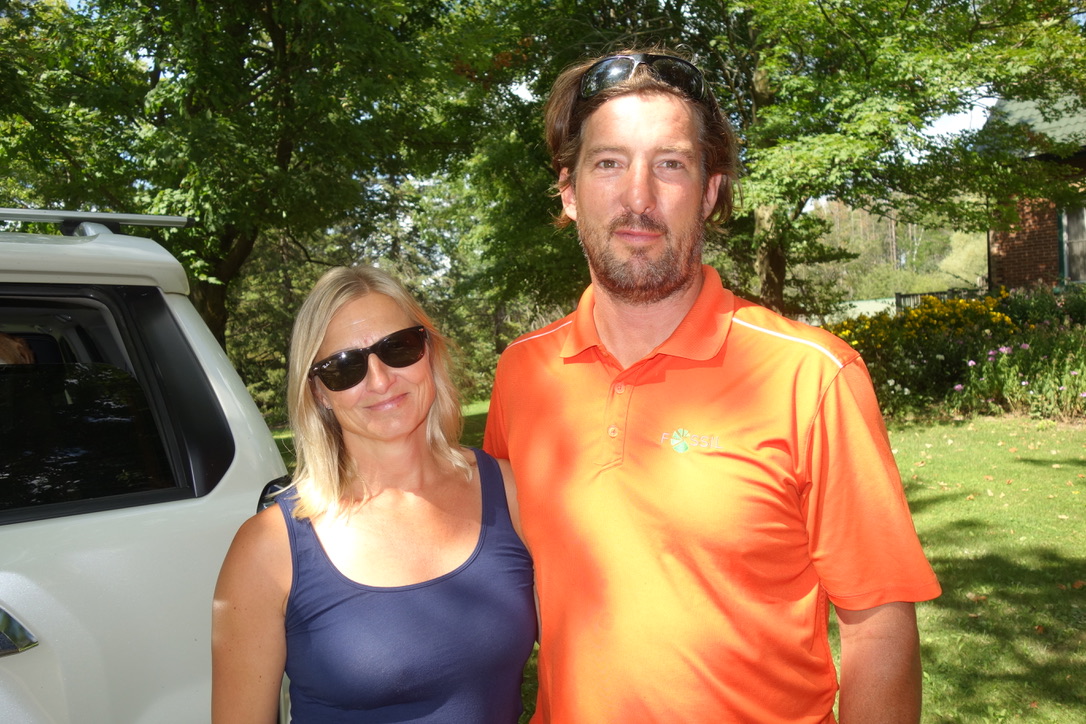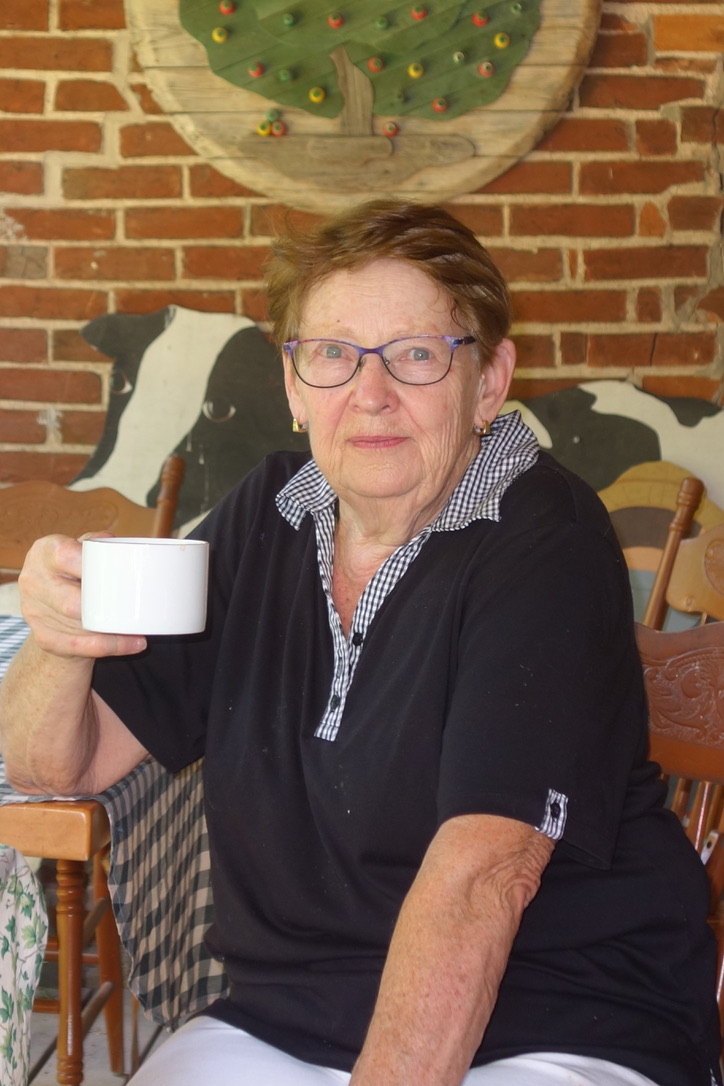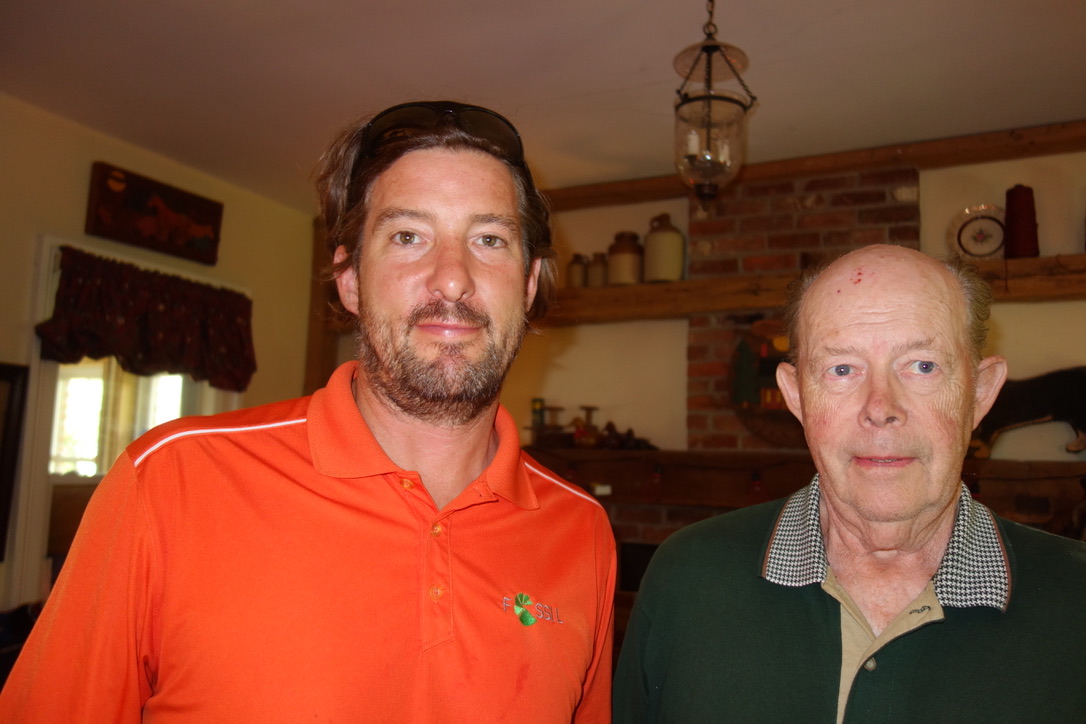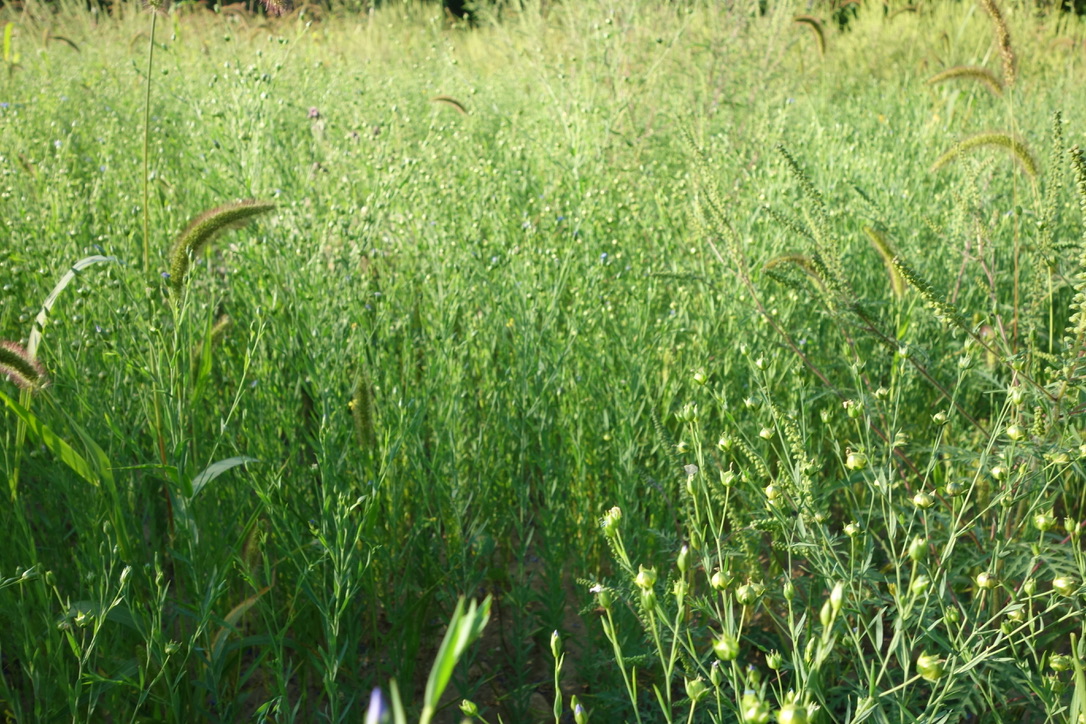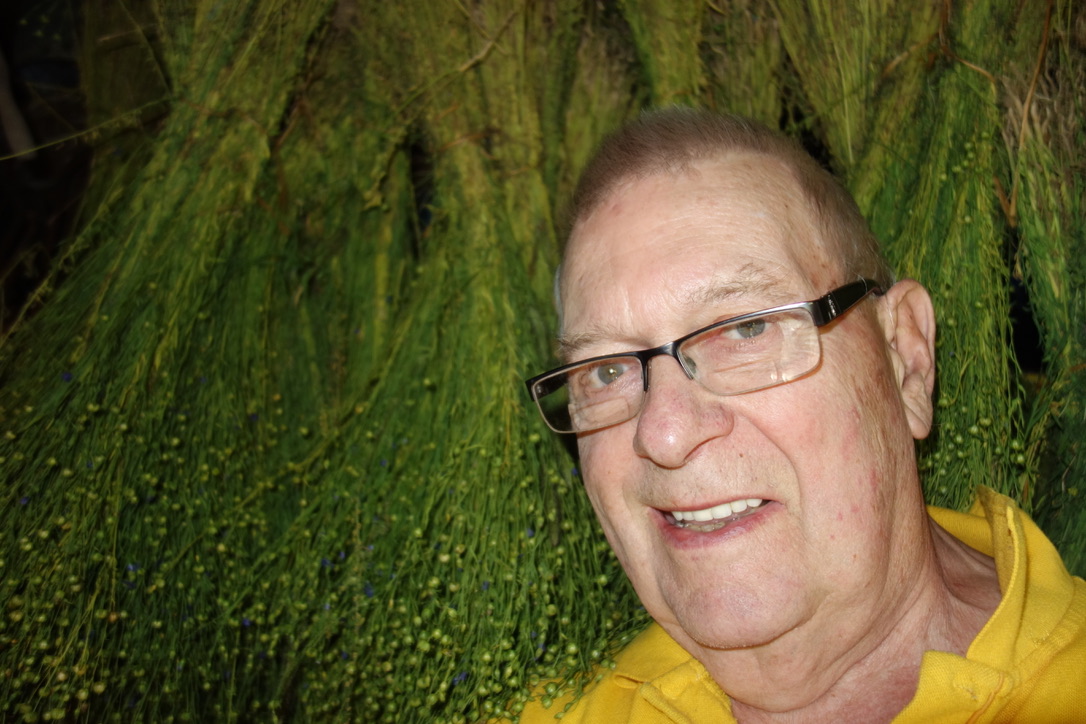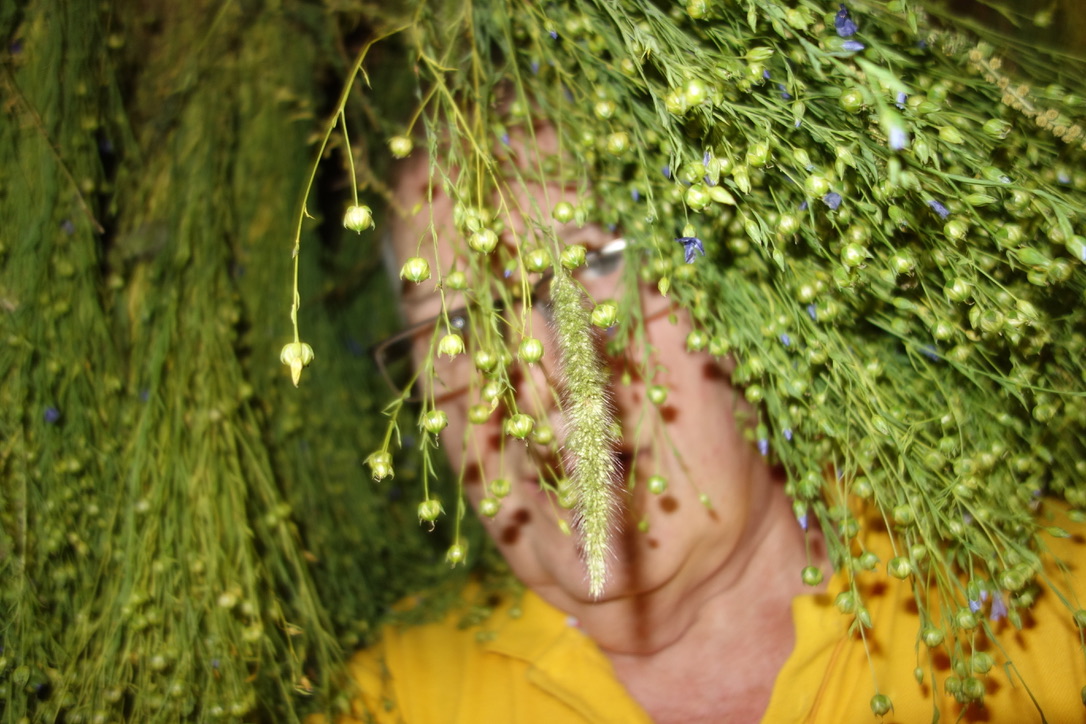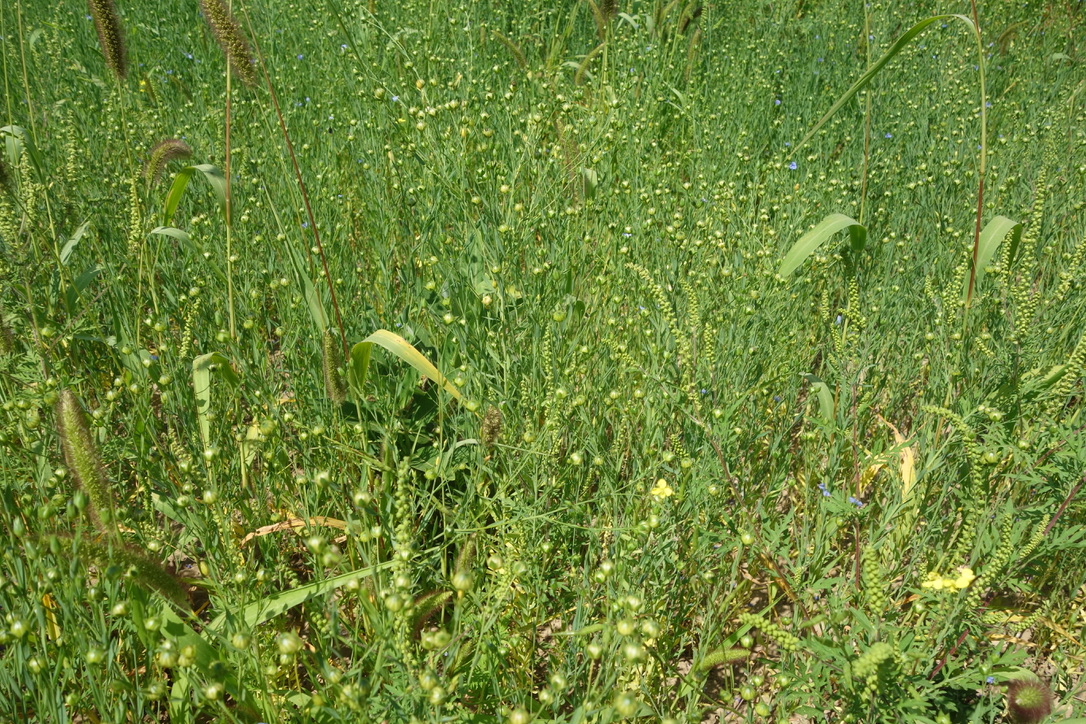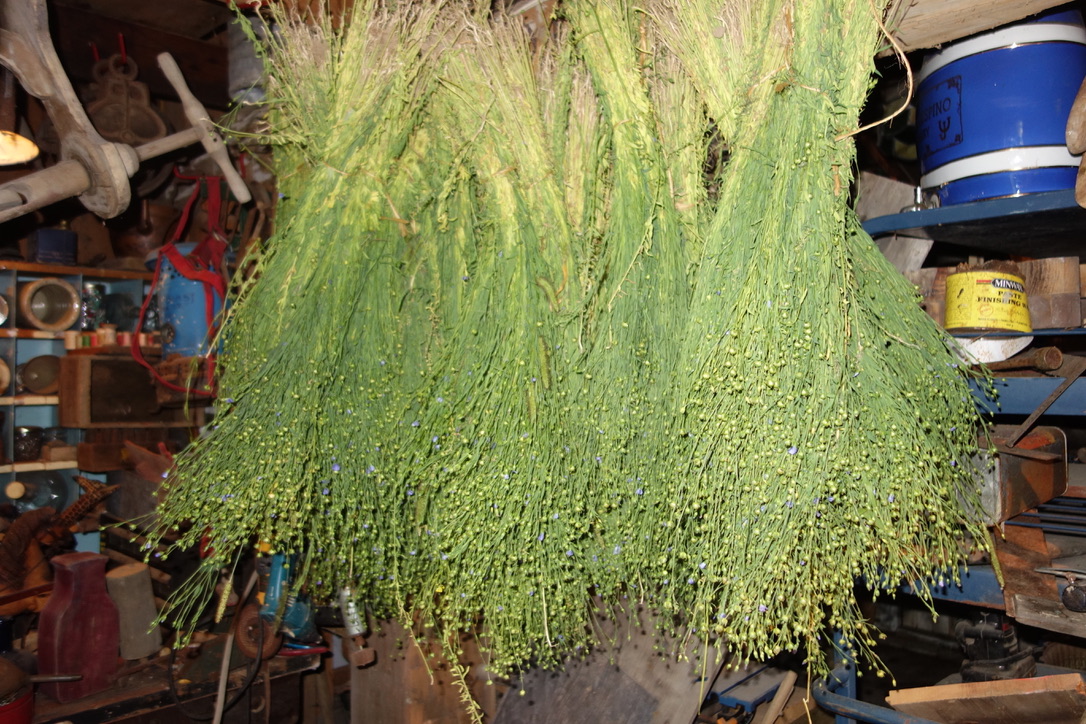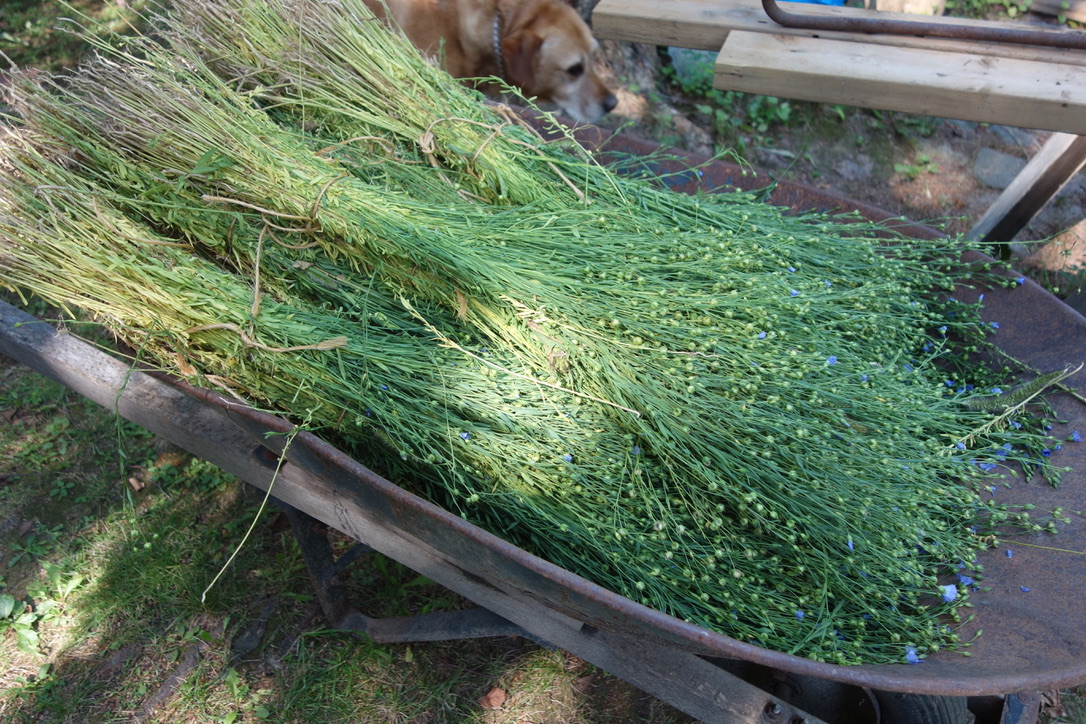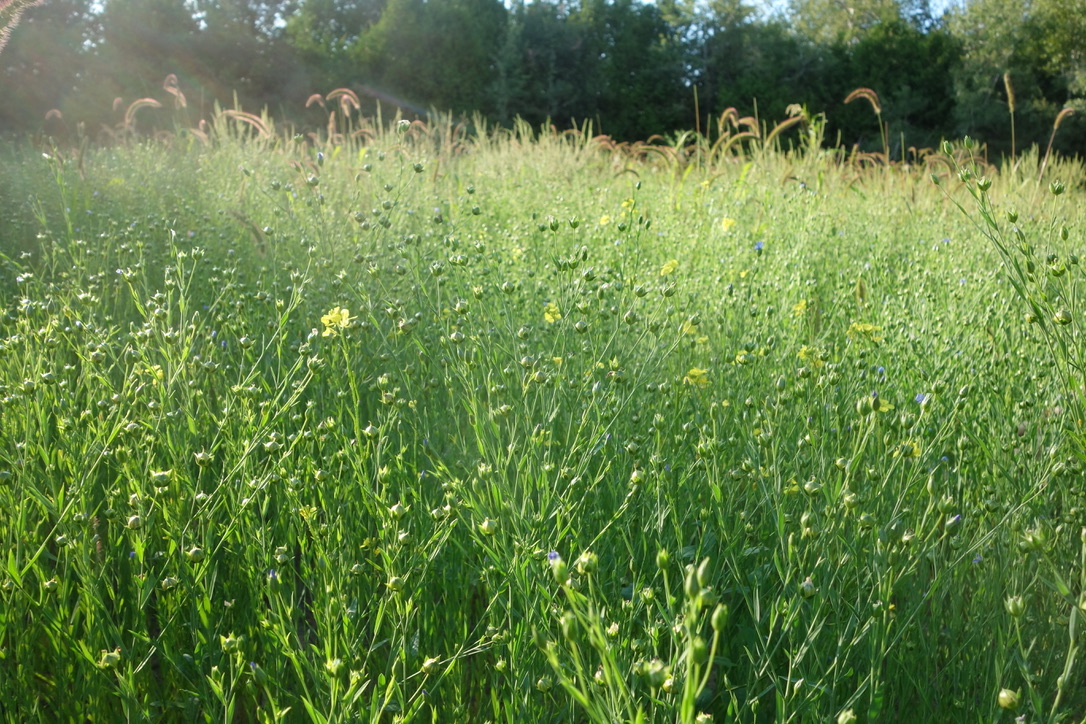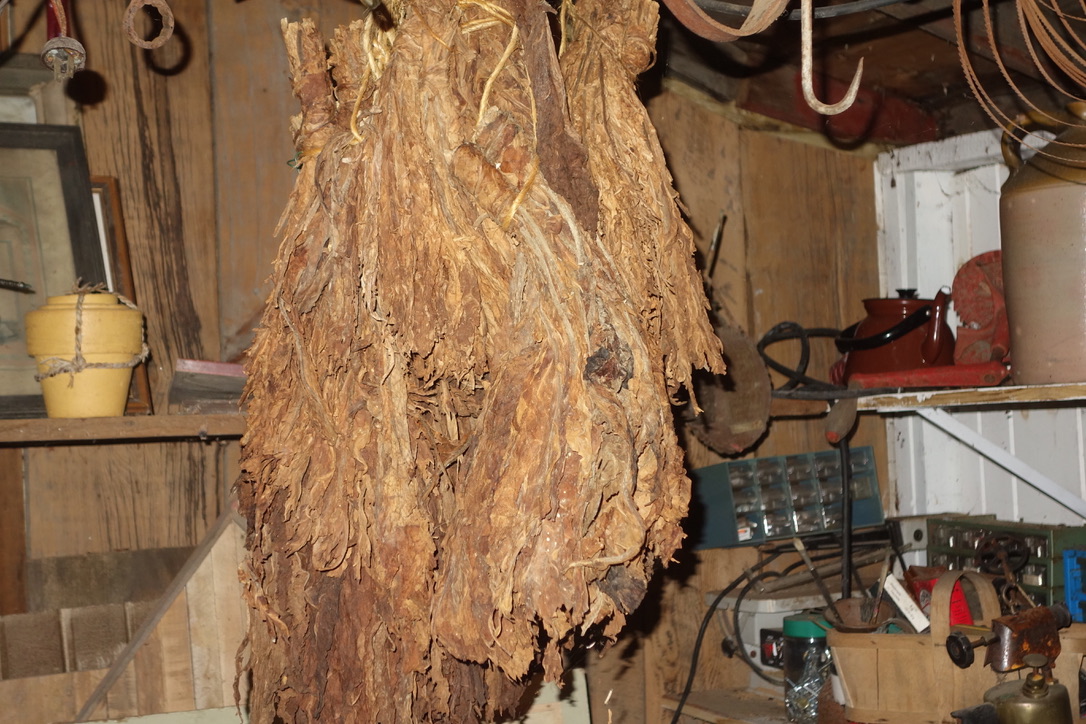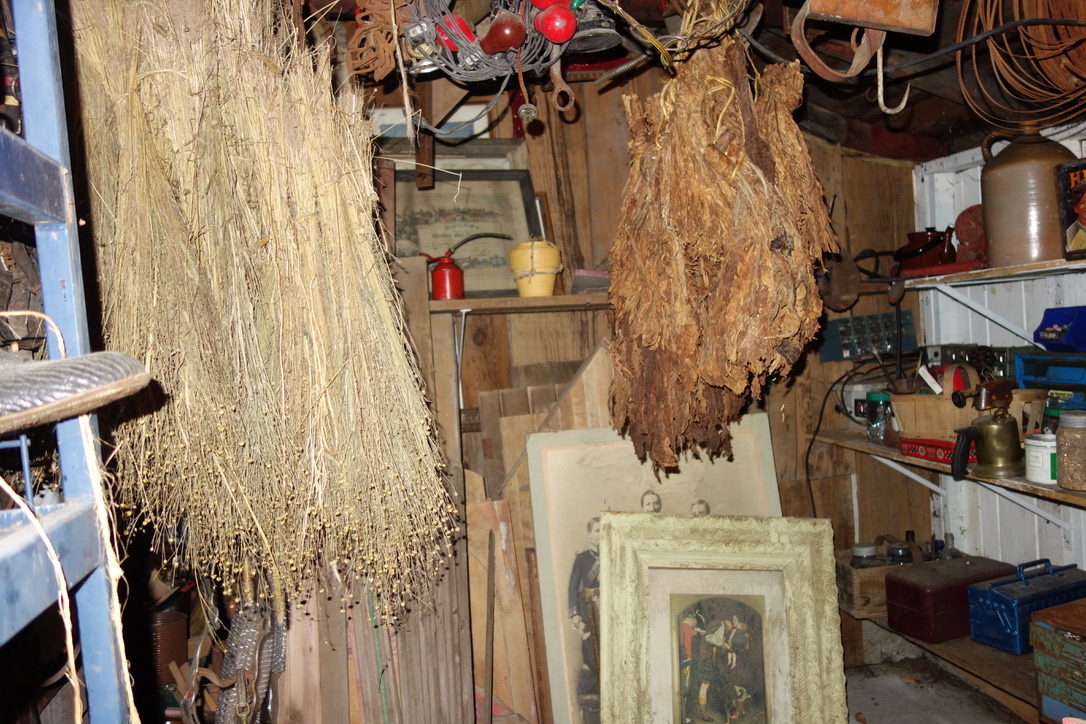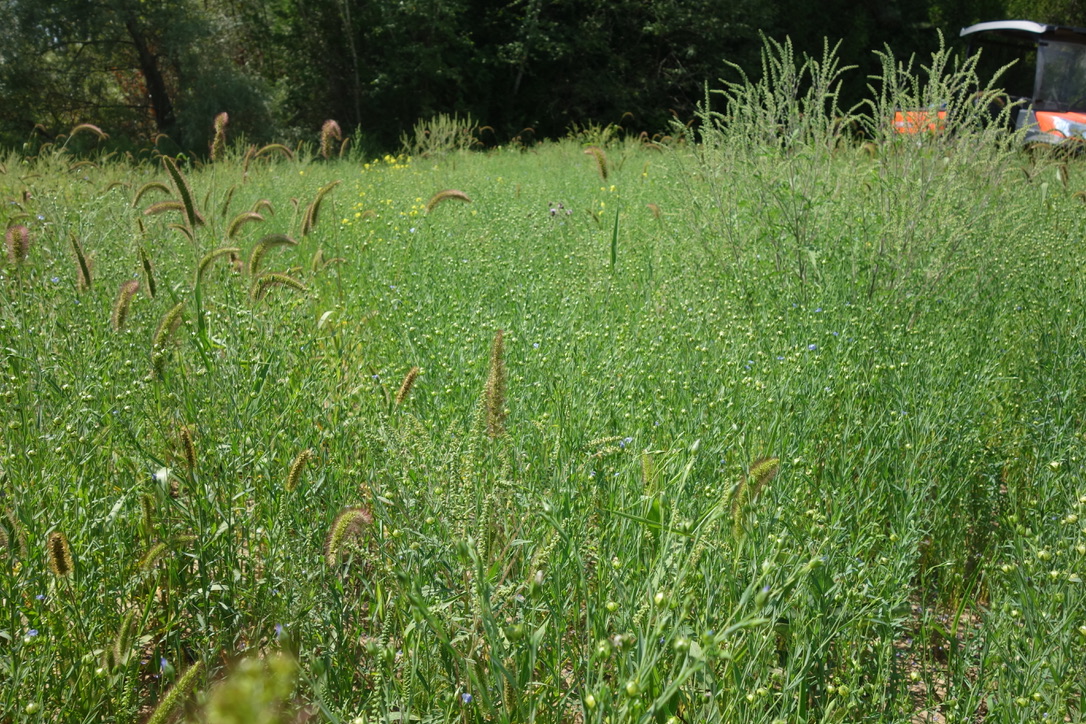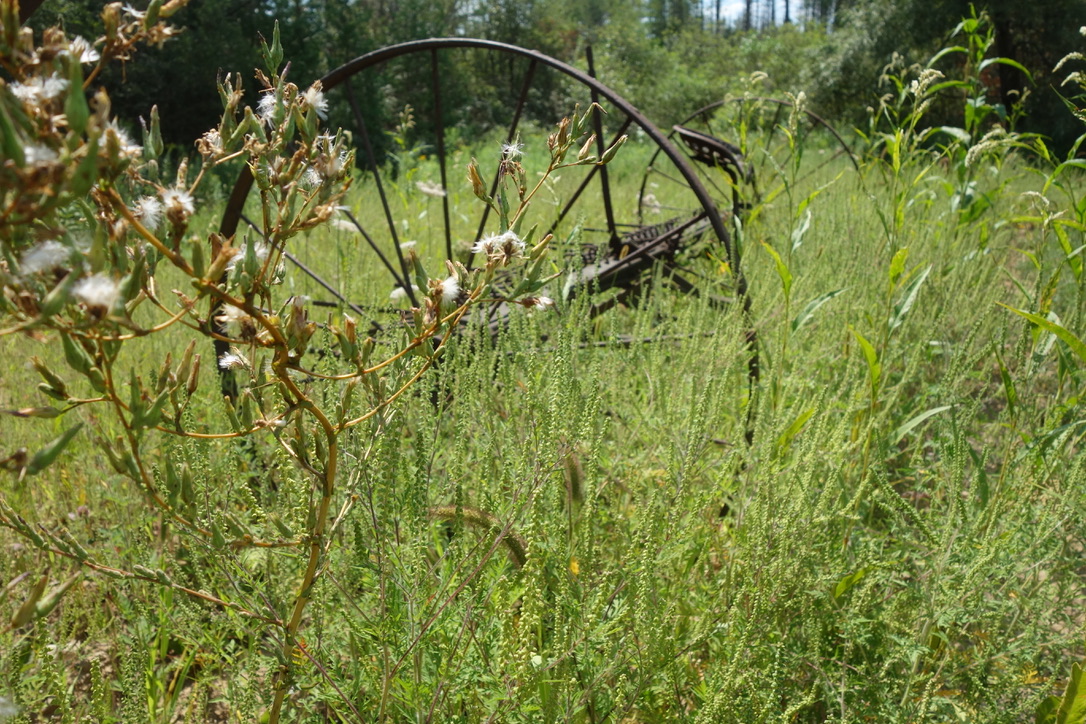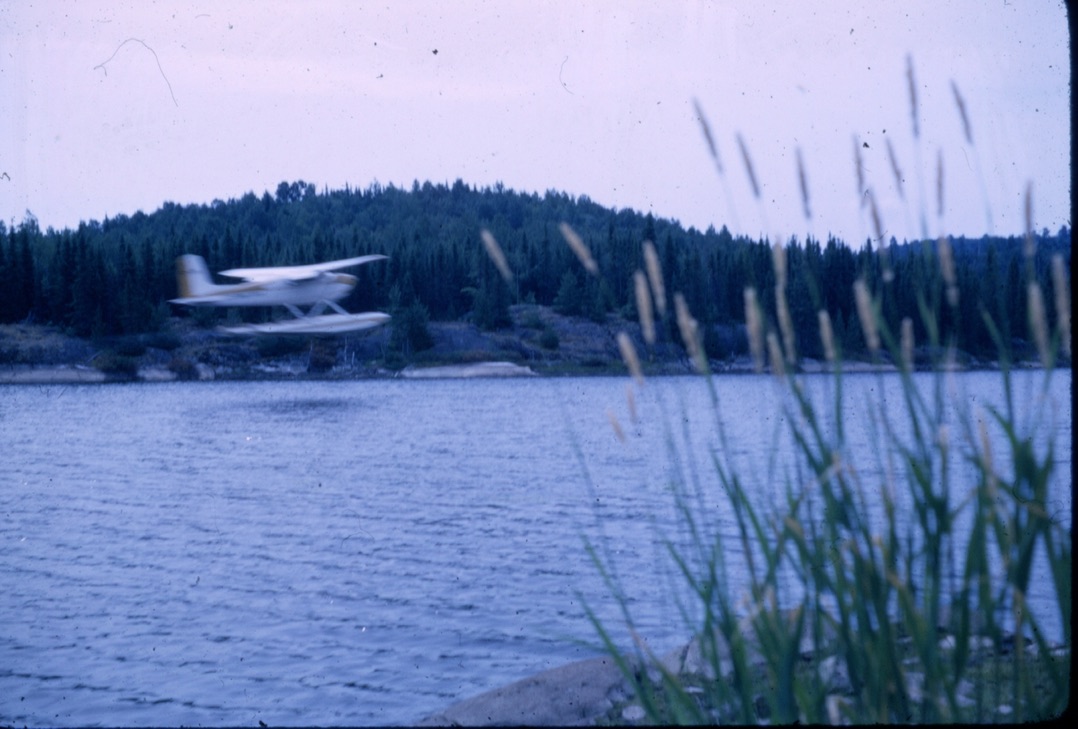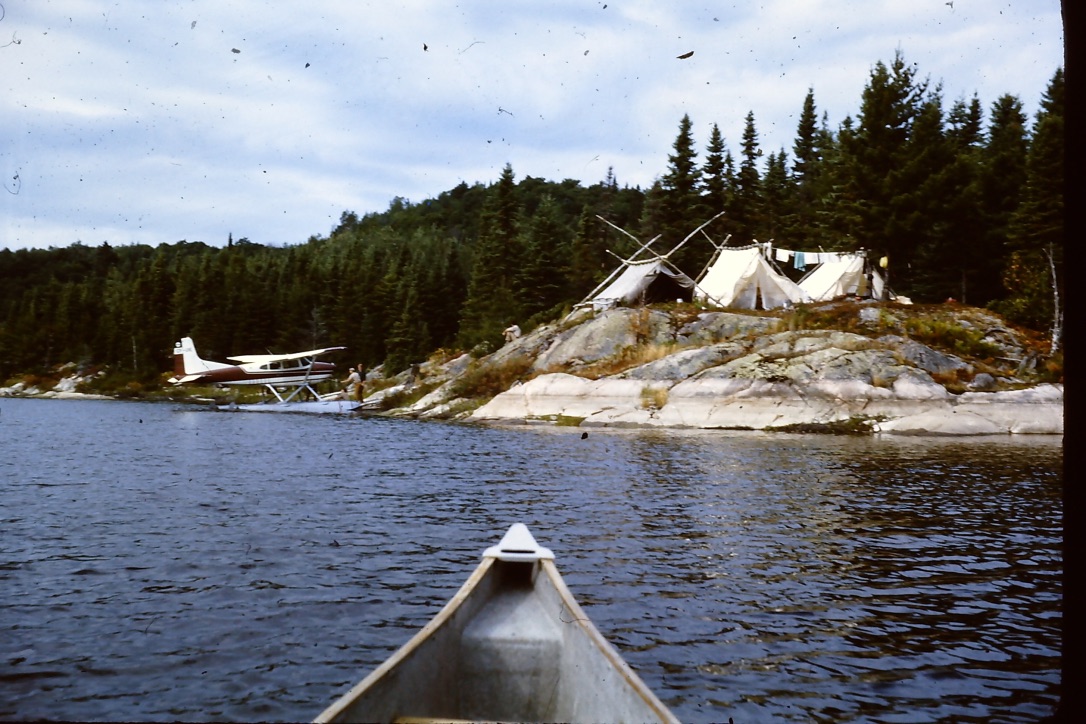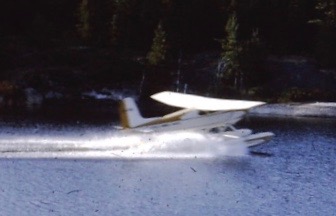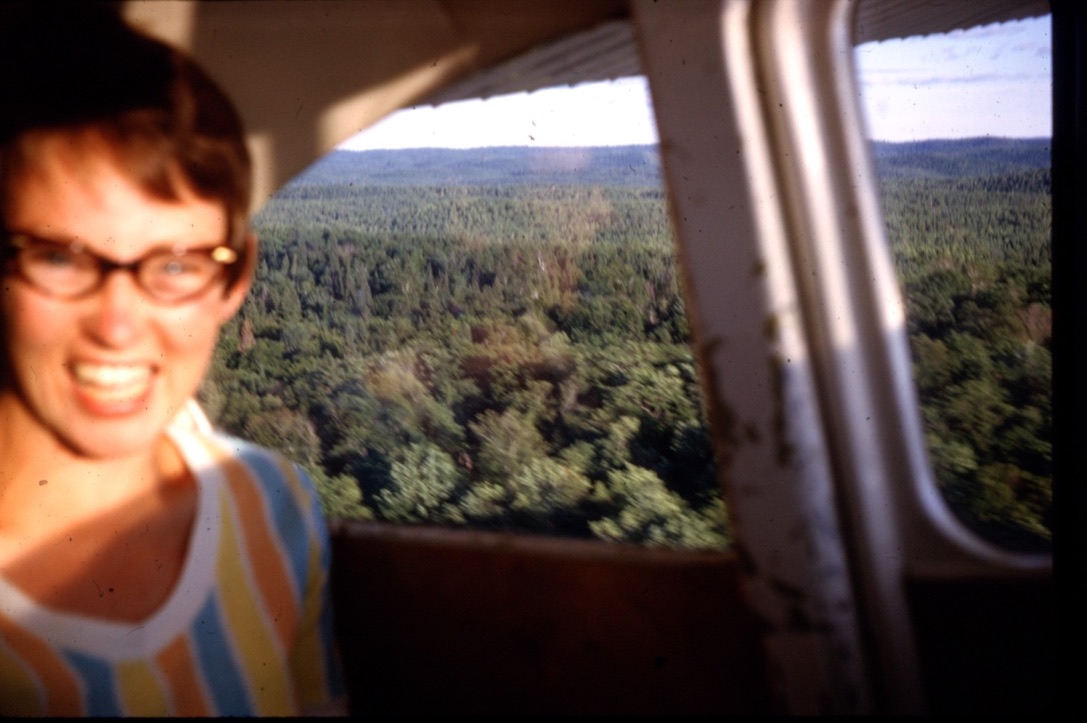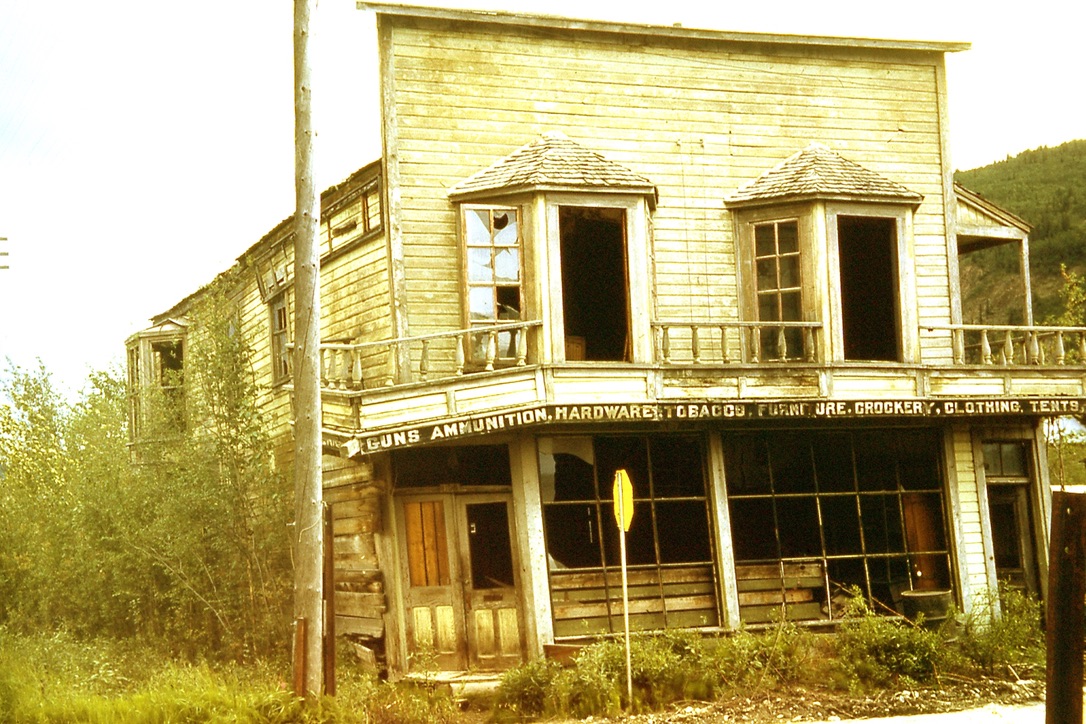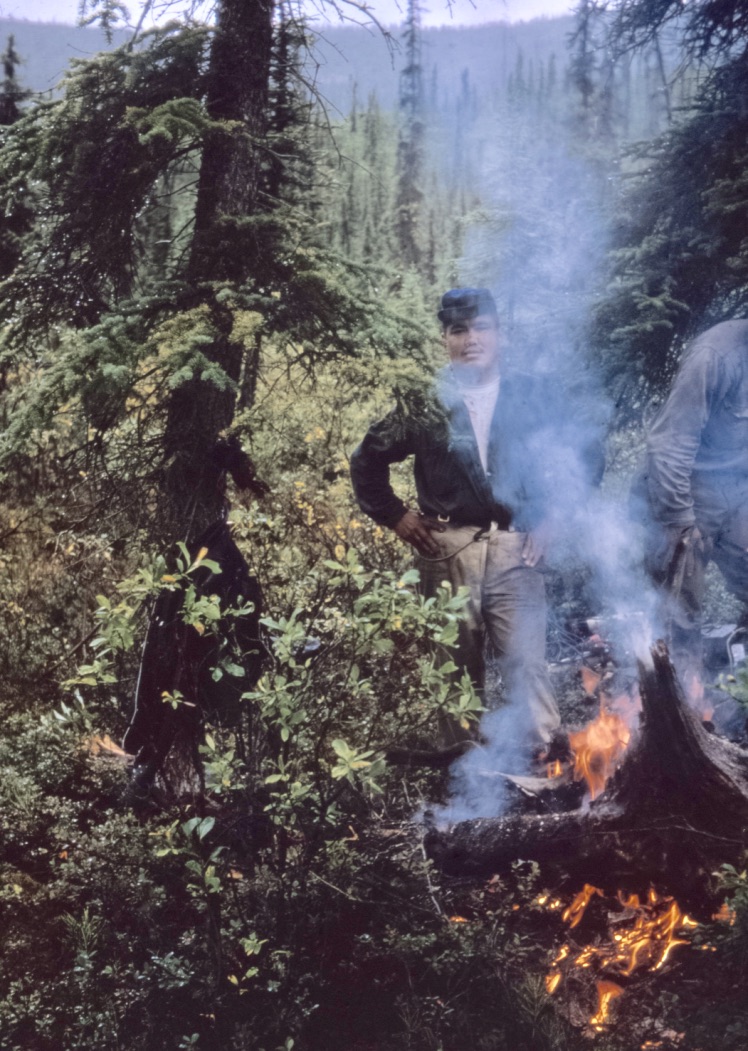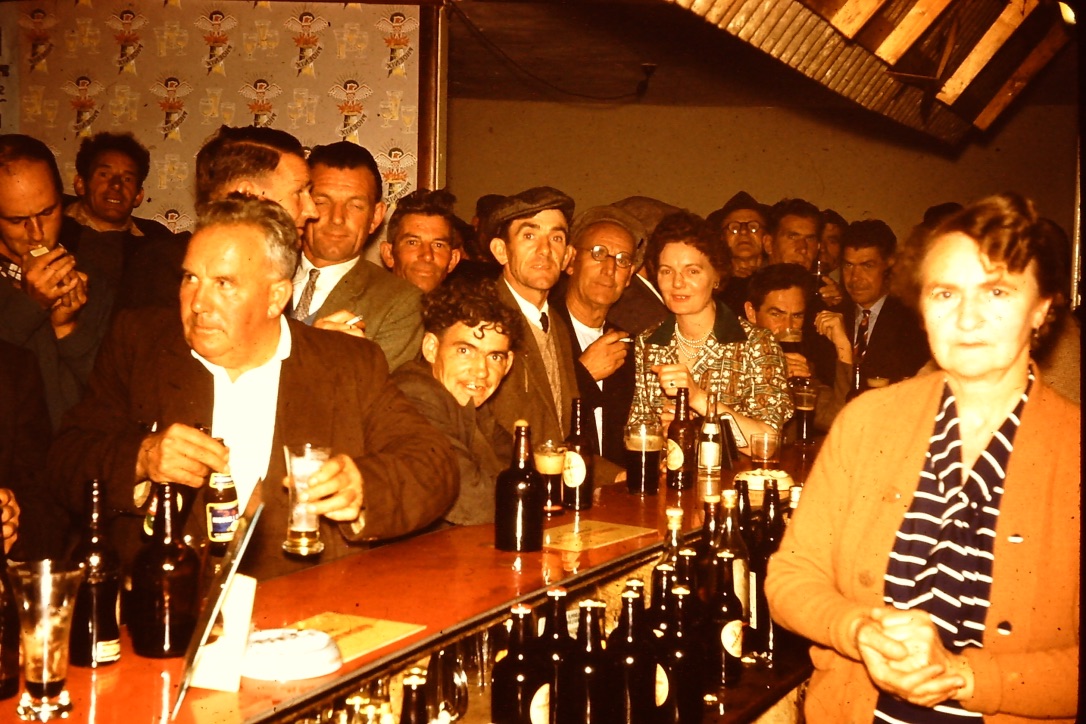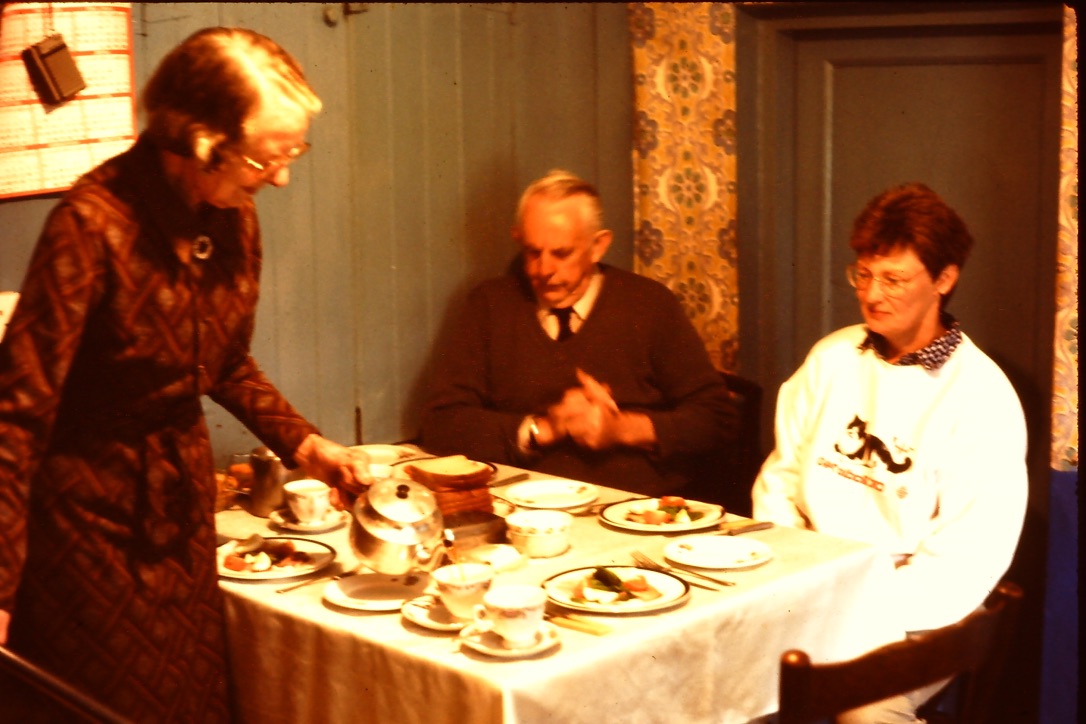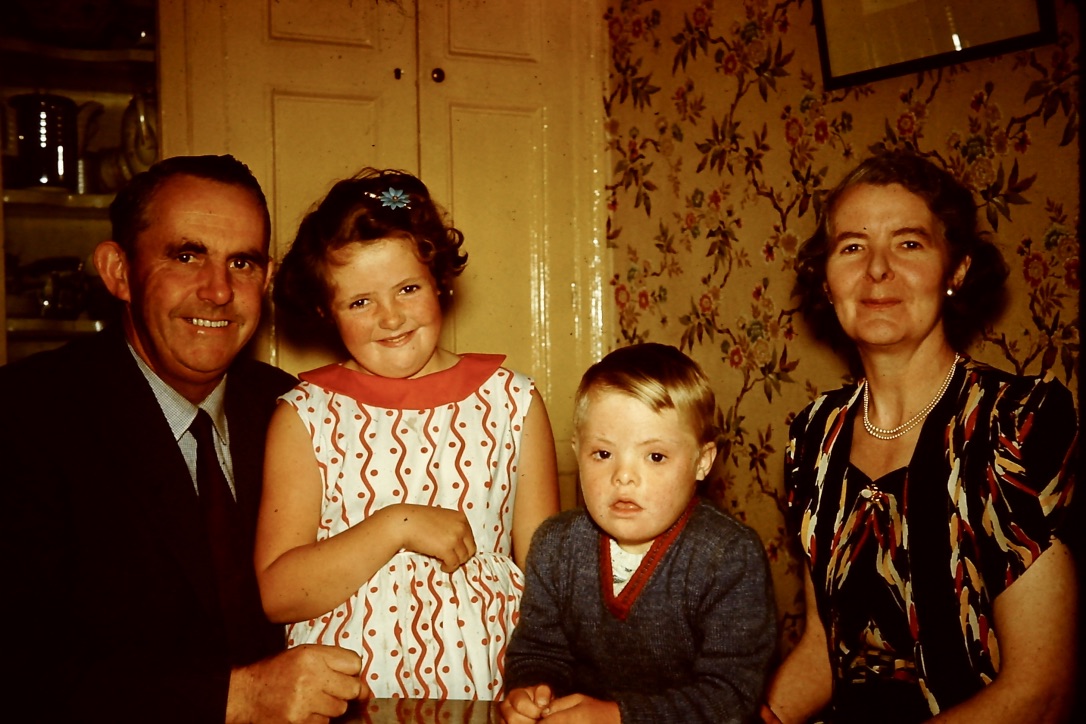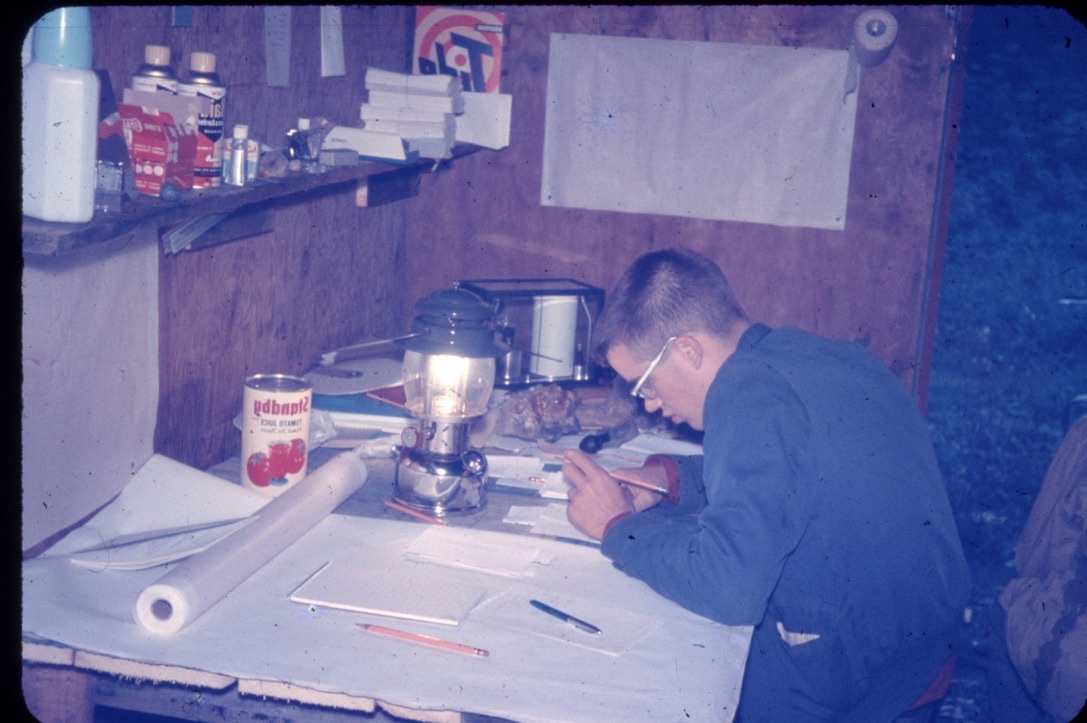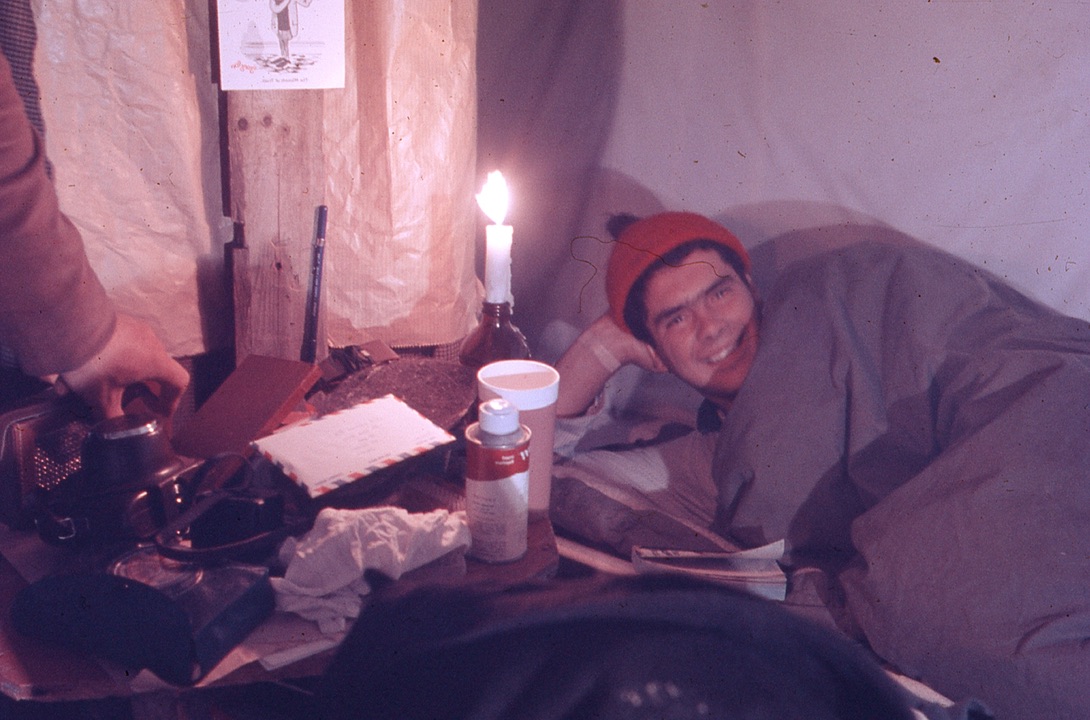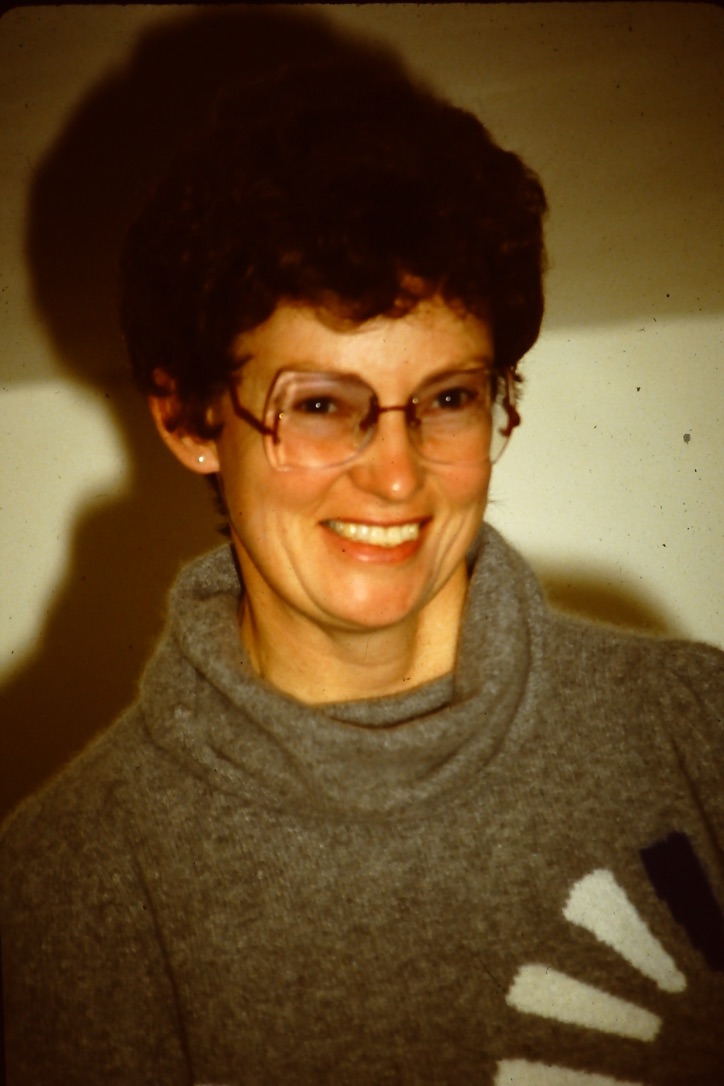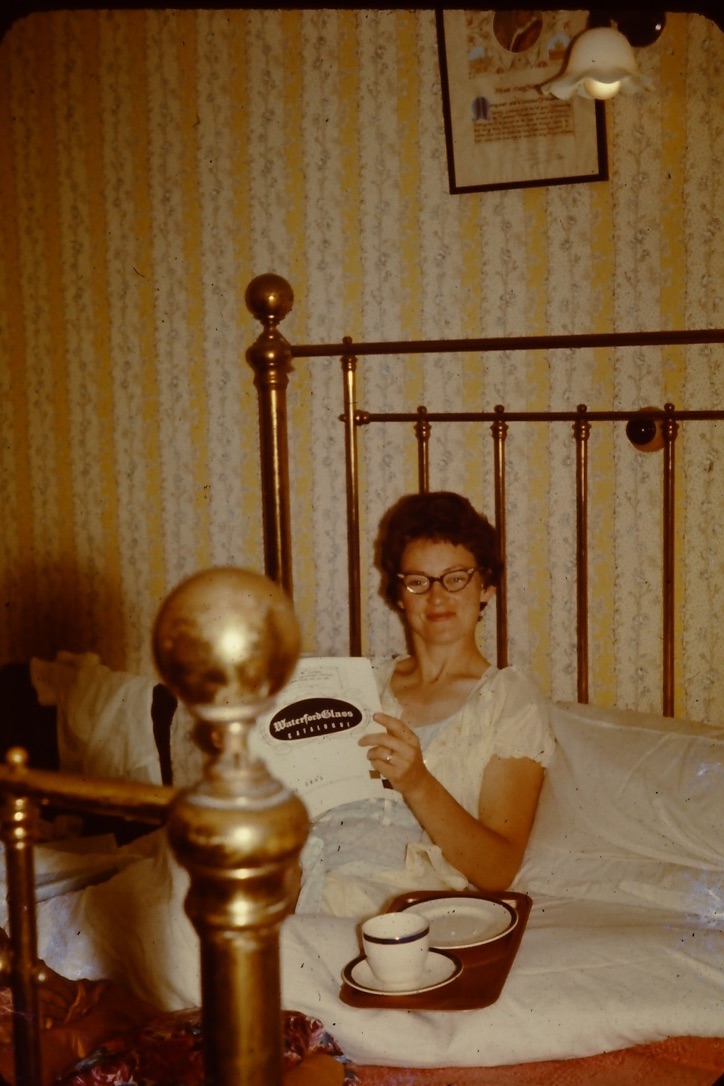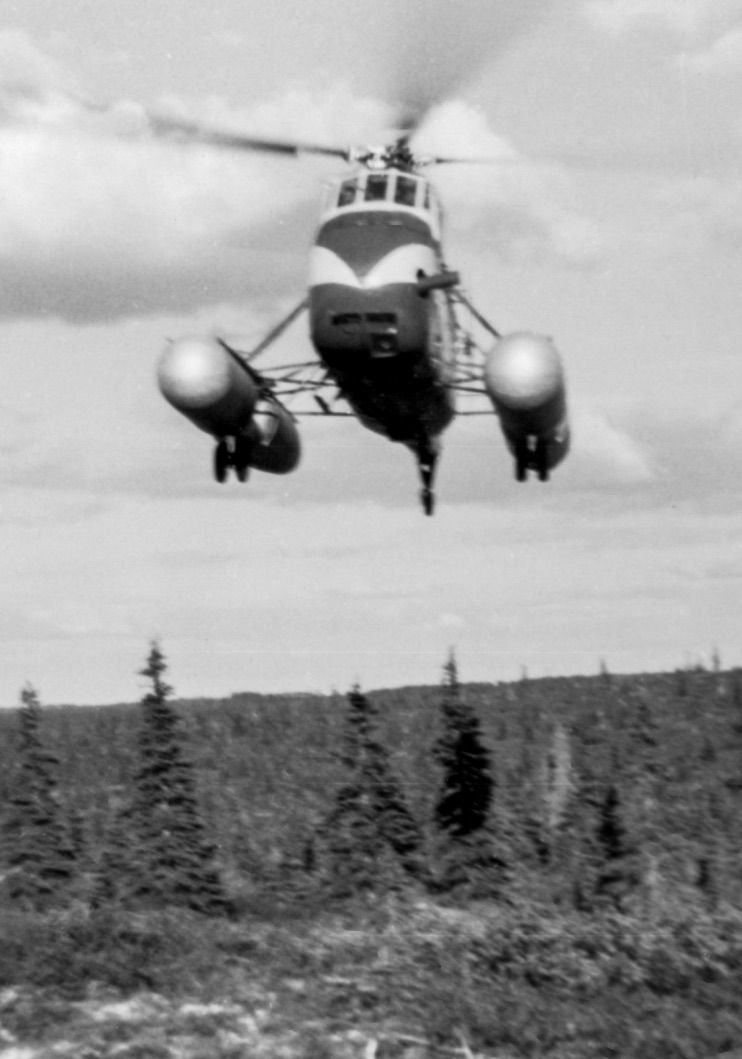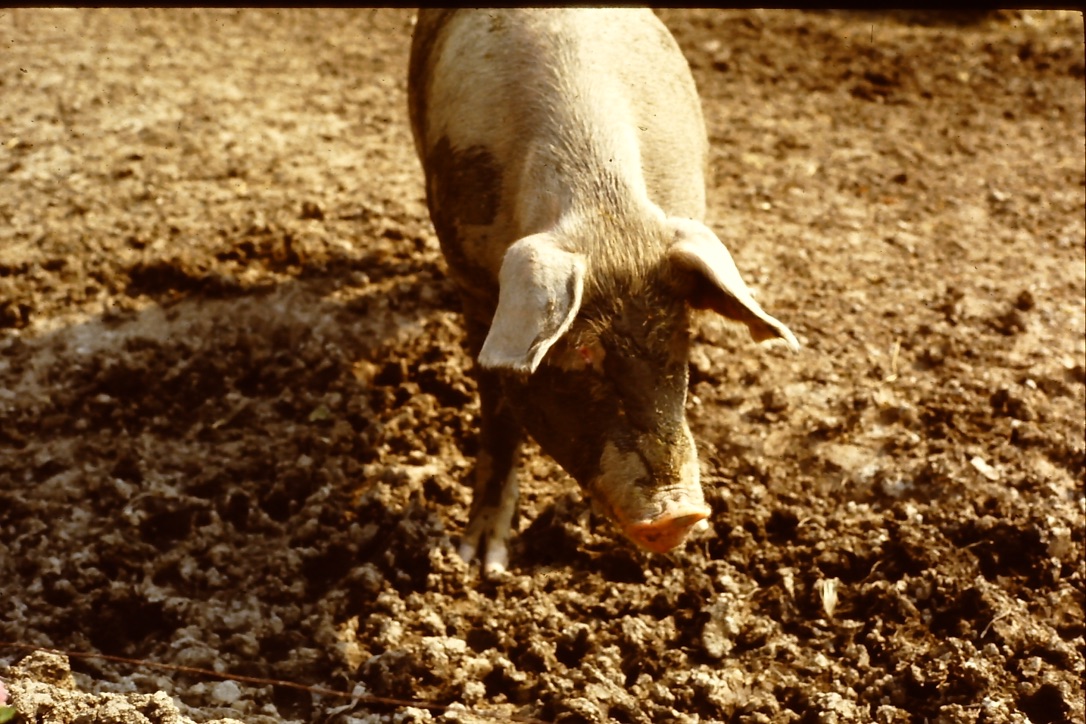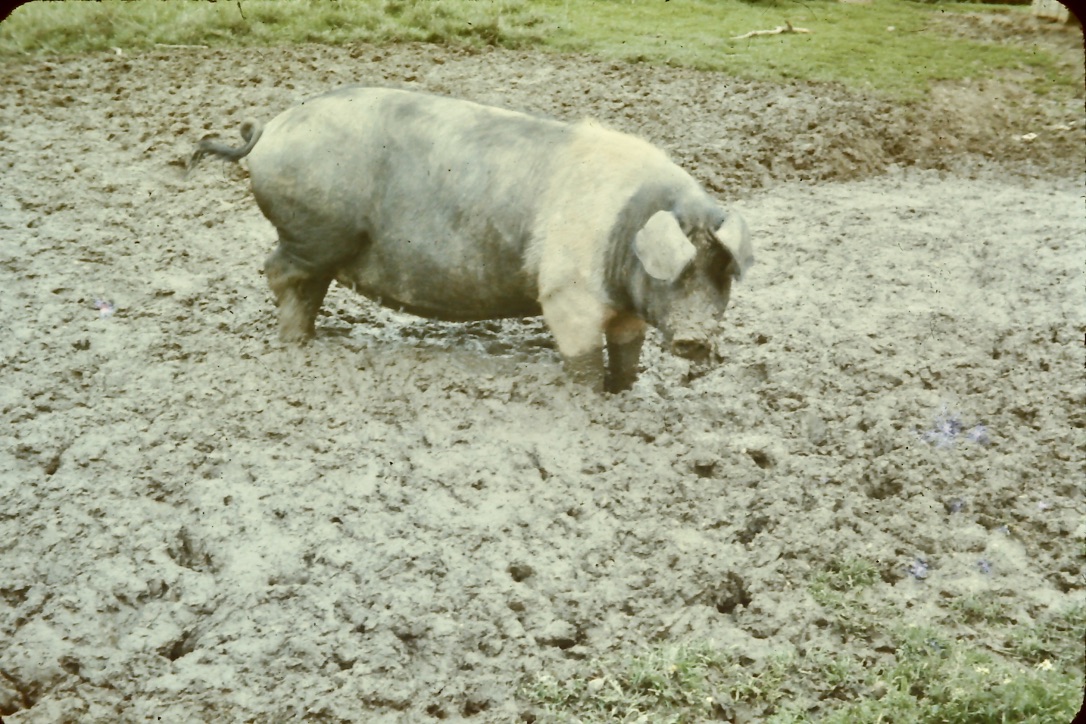EPISODE 98 FOOD…good and bad, AILMENTS, VIOLENCE, and ISN’T THAT FUNY…AN OVERVIEW
in 1961.
The building was slowly sinking into the permafrost each year. This picture has nothing to do with the story that follows. My job
for ten summers was as unique as the Dawson City hardware store.
Dinner at our fly camp in summer of 1964. After the supper of wormy stew we went
back to the good staple food of pork and beans. That is Bob Bartlett
pouring condensed milk onto something and beside him is Serge Lavoie.
This captures what life is like in he bush…cooking over an open fire. Very rough and unpleasant. in this case
the fire is much too large but it was made in the pouring rain when we took a lunch
time break…and tried to dry our socks. Fires were always carefully extinguished. Never once do I remember a fire
causing damage. One Question? Where would you sit here? Careful, you could
easily get piles. Yukon Territory job. 1961.
Many of our jobs had camp cooks, sometimes we ate in diners. But a lot of
the jobs were bush jobs where we were our own cooks.
Cooking. Essential was bacon…needed to grease the pan for both French Toast
and Pancakes, both of which we ate often in various forms. Note the blazing
axes in the background. A special light axe for marking trails.
1) French Toast was great for breakfast as long as the eggs lasted. Rotten eggs
made poor French Toast but that never happened. The nose was key to freshness.
French Toast had an added plus factor. Slabs could be eaten cold at lunch sitting
on a dry log. Two meals. Even three if there were some leftovers for supper.
2) Peanut butter…could be slathered on cold French toast. Or on anything. Peanut
butter could be eaten with a spoon right from the can or bottle. No wash up
needed. A perfect food. And if too many field mice found our cook tent then
peanut butter on a Victor snap trap solved the problem. Red squirrels needed
a rat trap but were also suckers for peanut butter. Rarely used though. There was
no trap big enough for black bears with whom we shared food a few times.
3) Rolled oats cooked fast for breakfast with brown sugar and
canned or powdered milk. Then the leftover porridge would cool and form a
gelatinous slab for lunch. The slab could be rolled with marmalade or
peanut butter in between. Scrumptious . Many many lunches of such
make my mouth water even today. wrapped in wax paper which served the
double function of starting the lunch time fire for our Billy cans of tea.
4) Salami or Polish sausage. Both kept well. The flies preferred to lay
their eggs in the slabs of sowbelly…bacon slabs…rather than the salami
or Polish sausage. Why? I am not sure but suspect the latter were loaded
with preservatives that the flies sensed but we did not.
5) Pork and Beans. A camp favourite even though the cans were often
too heavy to pack if we were not returning to base camps for a day
or two. Throw in a slab of butter and more salt and pepper. Smell
was terrific. Dining like kings and queens. There were side effects, of course,,
but the side effects were very healthy Nothing worse than constipation.
Or, as we called that affliction, “the screaming shits”.
5) Cookies…lots of them. Usually Peak Frean shortbreads of various shapes.
But I remember large boxes of David’s cookies on the Quebec job. I mean large
…about the size of a small suitcase. That company made lots of sweet things
with marshmallow fillings. We never put limits on consumption that I remember.
6) Food for fast consumption. On deep bush jobs where food service was by
bush plane at irregular intervals we would order some fresh food…like fruit. Maybe
a watermelon to eat right away or a six quart basket of peaches. Oranges were
best since they kept well. Sometimes we might even try a pie or cake…again
for fast consumption the arrival day. Gorge and starve.
7) Drinks. You might think we would order several cases of ginger ale or Coca cola
but that did not happen. Lots of tea bags and ground coffee. Hot chocolate made
with powdered milk was drinkable but barely so. Fresh milk was a luxury item.
Alcohol was never on site which I find strange on reflections because we always
celebrated the end of a job with a beer or double O.P. (Yukon job).
WE never had alcohol on the job. After a job, however, we celebrated. This is my favourite picture of celebration
in Ireland in 1960. Most of these men were our employees and they all enjoyed a pint of Guinness as did we.
8) Bread. Useful whether fresh or stale. Old bread got rather crusty but could
be softened in the form of French toast as mentioned above. Mouldy bread
was garbage but sometimes the mould was spotty and could be cut out.
Sliced bread got mouldy in the first four or five slices…deep in the loaf sometimes
a good slice was found.
9) Canned Prunes. The two terrors we wanted to avoid were Constipation and
Diarrhea. Bot are debilitating. Constipation seemed the most common hence
the canned prunes.
10) Pasta…lots of it in the form of Kraft Dinners, and a few attempts at
spaghetti with canned sauce…no fancy pastas however like
Lasagna…too hard to make. Kraft dinner best.
Mrs. Kennedy was the dominating person in Bonmahon. Ireland job. She also saw that we ate well. No rough food like we
had in our wilderness camps.
11) Mrs. Kennedy, on the Irish job, made my lunch sandwiches filled
with Lobster. A delicacy. But I had never eaten lobster and carefully
asked her, “Could you make peanut butter sandwiches?” She had
never heard of peanut butter sandwiches Both are good.
WHAT WAS BAD FOOD?
1) Wieners. I expect readers would find this wiener aversion surprising because
they are fast food items. Hot dogs…super easy The problem was that with time
our wieners exuded a white bluish substance…preservatives I think. On he
Groundhog River job I remember picking up a wiener with one finger…the bluish
stuff stuck to the finger tip. Did we eat them anyway? Not sure. We ate a lot
things that were disgusting.
2) Sowbelly. Again I remember the Groundhog River job where the blow flies
laid eggs in our slabs of bacon (really sowbelly). Cutting off the contaminated
end was part of the ritual of breakfast.
3) Canned meats. Edible but not pleasant. We referred to all cans
of preserved meat as cans of Clap.
4) Doughnuts. great when fresh but very soon turned into life preserver rings
as hard a bullets. Of course they could be dipped in tea.
6) Fresh fruit like grapes, peaches, pears, cherries, melons. Wonderfull
when the airplane arrived but very soon rotten or fly infested. We gorged.
Then chucked the rotten remainder in the latrine. There were
wild berries however. I was never sure which of the wild berries were
edible and which were not. Walter Helstein ate them all so he became our
berry tester. Blueberries were easy to get as were swamp apples (orange, large)
but they were super sweet to an extreme. Walter ate lots of red berries
that seemed inedible to me. (Groundhog River job)
7) Some dehydrated packages turned out to be wormy as mentioned in Episode
97 but that was not true of all dehydrated food.
8) Chocolates….in candy form or bar form. Fear of toothache from cavities
made all forms of chocolate suspect. But we always ordered a couple
of cases of chocolate bars. When we got a toothache we just had
to tough it out. No dentists in the bush. That applied to any ailment.
9) Moose meat: Marjorie was given a slab of moose meat to
cook for the fellows on a short camping venture to Wart Lake. There
was no way that the moosemeat could be made edible using
normal cooking skills. Tough as leather no matter what was done.
WHAT AILMENTS DID WE FACE?
1) My worst ailment had nothing to do with food. It was my feet. The constant
rubbing of my boots against the undergrowth soon wore through to my
feet. Water seeped in and got warmed up by my body temperature so that
my feet were cooking. By the end of some bush jobs my feet were as
pock marked as the fields of France in World War I. Flesh could be peeled.
2) On bush jobs in the Yukon, Alaska, Northern Ontario
we always carried a hand made billy can…a coffee can with a wire loop
for making tea. Usually using tea bags. It was possible however to make
Labrador tea from a common shrub with canoe like leaf shape with fuzzy
underbelly. Making tea was easy. Could be done anywhere with a small
fire. Sitting was the problem. The undergrowth was often spongy with wet
mosses of all kinds. Sitting on the moss was like sitting on a pillow…a
wet pillow. We looked for dry dead logs instead. Sitting on wet moss
day after day was crazy. Piles! Anyone who has had piles knows
the discomfort. We sure did and looked for windfall strewn forest
floor where there were logs to sit on.
3) Tooth ache…terrible thing. Constant pain. happened occasionally.
Nothing we could do other than tough it out. I seem to remember suggesting
we tie a string to a tooth and the other end to the Yukon cabin door. Slam the
door and out comes the tooth. Only time I remember that working was
with my brother way back in the years when he trusted my ideas.
4) Food poisoning. I got that on the Cochrane job from eating rotten
balogna. I could not work and spent a couple of days in my sleeping
bag wondering if I was going to die Everyone else went to work. My
only visitor was a big black bear who arrived when all others were gone.
No problem. he or she was just sniffing around the cook shack where
some scraps must have been available.
5) Serious cuts with axes. Using a blazing axe requires a little skill.
Alway put blazes on sold trees. Never try to blaze a leafy branch. Why not?
Because branches are elastic. Hit a branch and it bounces back.
Along with the bounce back comes your blazing axle. I remember a particularly
difficult fellow would just would not learn. Sliced himself badly with his blazing axe
and had to be taken out on a emergency flight. No loss. He was just
too much trouble to have around. Lazy. Looking for the easy way. Accident
prone.
6) Falling. So easy to do and a fall could have serious conseqences
as happened to Walter Helstein when he fell on a sharpened picket which
pierced his hand and was subsequently infected because we couldn’t get
a plane to pit him up because the weather turned stormy.
We warned Walter not step on fallen tree trunks. Never step on a fallen log…to do so was to
possibly slip and fall headlong into whatever was on the other side. Step over. In Walter’s case sharpened
pickets like the Viet Cong used in the Viet Nam war were low to the ground on the other side.
Freshly cut by lone cutters. Lethal. Easy to
get hurt. Walter was too old for the job Perhaps sixty. He couldn’t step over logs.
The end result was tragic (as mentioned in earlier episode), poor Walter lay in the tent for days
moaning as infection spread. When float plane could finally land, Walter was in very bad
shape and spent a long time in hospital recovering…months. All from a single misstep pmtp
a moss covered windfall. We never saw Walter again. Missed him.
WAS VIOLENCE COMMON?
Nerves get frayed on tough bush jobs where two or three men have to live together
under poor conditions. Tension develops over small things. ‘ Who ate all the chocolate bars?
My pack frame load is heavier than yours, you bastard. Let’s rotate he lead job when blazing
trail. You jerk, your goddamn belt buckle has made the compass wrong.’
It is very easy to get on someone’s nerves even in the best OF jobs. On a bush job
tensions occur fast. How are they best handled? Here I turn to Floyd Faulkner
again (Groundhog River job…3 months together on a ground crew .searching for anomalies found
by an airborne crew) Even if compass bearings were correct we sometimes made
errors. One time, however, was really bad. “Al, you take the lead with the compass,
we’ll do the blazing.” Big mistake. My Boy Scout belt buckle was big and bronze. it
deflected the compass. We were hopelessly lost by the time that error was discovered.
Floyd’s reaction was laughter. We faced hours of labour retracing our steps, correlating
our position with the aerial photographs. I was 17 years old and threw a hissy fit…began
thrashing at the jungle undergrowth and yelling like a stuck pig. “Goddamn bastardly bush”
Floyd thought that was even funnier.
From that incident I got the nickname “Fucking Al” which was a term of endearment.
Another incident on the same job made me look like a fool. We had to pack our fly camp
out to the Groundhog River from some distance east…miles. There had been big storm
and the tents and fly sheets were wet and terribly heavy. A real bitch. “Bob, my load
is way heavier than yours.” “OK, Al. we’ll switch loads.” Another stupid incident.
Bob had the big wet tent. It was so heavy that by the time I reached the Groundhog
River, my packframe was bent into a curved piece of useless junk. Bob and Floyd
were amused. Make me look like a fool, right?
All the years I worked for Dr. Paterson there were no fights. Quite amazing because
the job was very tough and the communities were sometimes not prone to
lovable relationships. But no violence. On one occasion Dr. Paterson was amused…
no, incredulous..when the
Alaskan branch of Humble Oil armed us all with heavy duty rifles. Our company
never gave us weapons for fear we would shoot each other. True.
No need.
Really, we had a good time together nearly all the time. That was why
I loved the job so much.
ONE CASE OF VIOLENCE IN TEN YEARS
One summer I took a survey job with the Ontario Department of Highways building
Highway 17 across Northern Ontario. We were based in a trailer camp outside
the village of Hunta. Eight of us about 18years old. . An age when stupid
things happen. One of our crew was ‘disturbed’…really a bit wacko. John (no
last name used here) just did not fit in. He could not fit in anywhere. There was
something seriously wrong with him. It took a while to surface but when he snapped
we were lucky that no one died. Some of the boys picked on John as teen agers
are prone to do. Like a big Boy Scout, I took John on my survey crew and got along
OK … not terrific but OK. At least until one day when I
signalled John to move to the right or left just to keep our line straight as we could
John turned … looked at me….and threw his blazing axe at me. Missed by a foot
or two. But there was no reason for the sudden anger. I was least likely to make
fun of him. Privately I told the crew foreman who was reaching a point where he
realized John was a problem.
That night John did something I can never forget. We were all asleep or
dozing in the trailer. The night was black, Suddenly there was a loud crash
at one of the bunks. John had got up silently. Holding a large granite boulder
high above one of the guys who had teased him… a Finlander from
Thunder Bay as I remember. Then John dropped or threw the rcck down hard.
The rock smashed a big gallon water can beside the Fin’s head. Crushed completely.
We got the lights on. By then John was back in his bunk. just lay there while
the rest of us clustered around the water jug. He was silent. He did not move.
He must have done it. Had he intended to
kill or just to warn? We were never sure. The next day officials arrived to take
John away. We never saw or heard from him again.
That was the only violent act that got close to me in ten years of exploration.
FUNNY THINGS HAPPENED ON EACH JOB.
Humour is a tricky thing to present. Incidents that I consider funny may
seem insensitive and crude. Like the time that Bill and I were sitting
in a bar in Dawson City. We had camped outside the town on an old
sourdough claim site. Needed a beer badly after a tough night and day.
We were really just kids pretending to be men. Beside us on the floor
of the bar two very large people…one male and one female…had decided
to copulate. They were having difficulty with their clothes because both
were dead drunk. Bill and I kept our cool and pretended the behaviour
on the floor was normal. the bar tender came around the bar and began
rolling the amorous couple towards the door. I seem to remember the
rolling but no sure how he got them out the door. They took a lot of door
space. Later Bill and I laughed and laughed. You may not consider
that funny.
Bill and I worked damn hard on that Yukon job. We deserved s week end break in Dawson City. Here Bill is
plotting our data. Sadly his Dad died in the middle of that summer and he had a rush flight home.
On another occasion our contractor, a mining speculator called Dr. Aho
from BC, had the habit of buying newcomers to the Yukon ‘Double op’s”
at the Mayo Landing hotel. “Here boys have a Double OP” What
is a Double OP? It is a liquid explosive. Rum and Whisky sent
to the Yukon was double regular proof…i.e. damn close to pure
alcohol. Multiply that times twice and you will understand what happened
after only one of these was consumed. Dr. Aho thought that was funny.
I agreed after we had been around Mayo Landing for some time. Lots
of heavy drinking. Even our pilot Bob was drunk much of the time.
Isn’t that funny?
Then there was the time we sent Joe Fortin to Chibougamau in1958 to
get us food. He flew out. Then at dusk he flew back. Just getting
out of the Beaver was a chore. He fell into the water from the pontoon.
Joe was dead drunk. He spent his time and our money at the
Chibougamau Inn. Forgot to get us food. Isn’t that funny?
Bill Gilbey in bed on the Marathon job
Then there was Bill Gilbey (Gilbey’s Gin family) on the Marathon job
thumbing his way through the women’s lingerie section of Eaton’s catalogue
saying “We are a pathetic bunch relying on Eaton’s catalogue for our pornography.”
Isn’t that funny?
Then you will remember the BC job at Merritt where the mine
manager and geologist mistook Marjorie for a Vancouver hooker
that I had hired as company at night. This picture is not the motel
room bed but gives the right impression all the same. Isn’t that funny?
Then there was our flight from Anchorage, Alaska, to Seattle with a lot of American
military brass flying out of Tokyo. Our regular flight had been cancelled due to
crippled landing gear. The US officers were a stiff bunch. None
of them drank. So the stewardess gave us her full attention. Free
drinks. When we sobered up in a Seattle Hotel we were all
wearing Japanese kimonos. Isn’t that funny?
Then there was Pete in the Yukon, lying in bed each night
reading the Bible. He could quote chapter and verse by heart.
I wondered. “Pete, you must be really religious?”
“Not so at all. I read the bible just to get into arguments..really
I am an atheist. Isn’t that funny?
Then there is our helicopter pilot on the Alaskan job awakening
us on the camp PA with his charming “Let’s get Fucking Airborne”
Or the camp cook explaining the finer points of eating moose heart.
Isn’t that funny?
Then there is Barney Dwan warning me to be careful crossing Irish farm
fields. “There was a nun who took a short cut and all that was ever
found were her boots with her feet in them.” (Hogs got her)
Isn’t that funny?
Then there were all those lonely hearts club letters I received on
the Groundhog River job. Dozens of young (and older0 women hoping
I would marry them or at least help them out of poverty. Those letters
came when my friends Russ and Jim enrolled me in the club.
Isn’t that funny?
Obviously, a lot of these stories are not funny at all. Unless you
are 17 or 18 years old enjoying the full panorama of life.
alan skeoch
August 2020
Next EPISODE 99…LAST FLIGHT OUT ON A CRIPPLED BUSH PLANE
